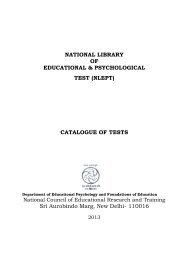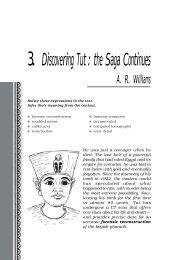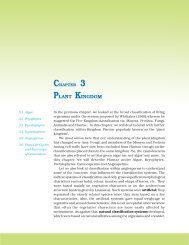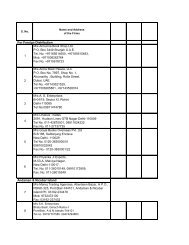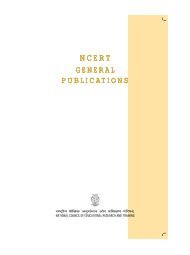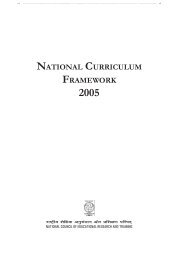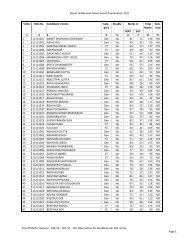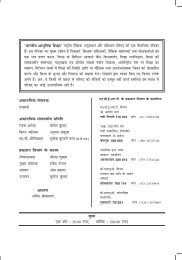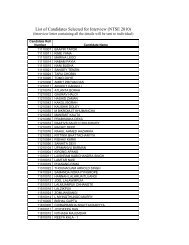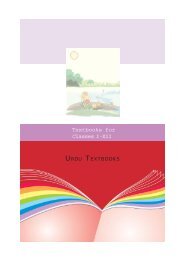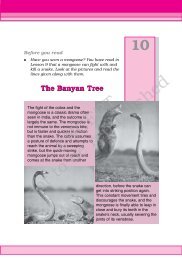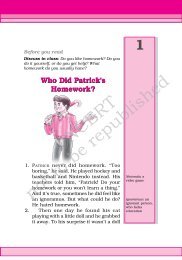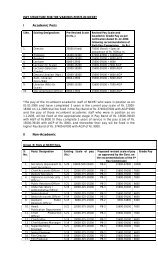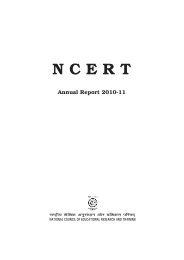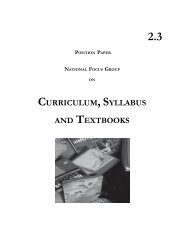Minutes of 48 PAC Meeting[1] - National Council Of Educational ...
Minutes of 48 PAC Meeting[1] - National Council Of Educational ...
Minutes of 48 PAC Meeting[1] - National Council Of Educational ...
Create successful ePaper yourself
Turn your PDF publications into a flip-book with our unique Google optimized e-Paper software.
Planning Programming Monitoring and Evaluation Division<br />
<strong>National</strong> <strong>Council</strong> <strong>of</strong> <strong>Educational</strong> Research and Training<br />
New Delhi<br />
<strong>Minutes</strong> <strong>of</strong> the <strong>48</strong> th <strong>Meeting</strong> <strong>of</strong> the Programme Advisory Committee<br />
(<strong>PAC</strong>) <strong>of</strong> NCERT held on 8-9 March 2011<br />
The <strong>48</strong>th meeting <strong>of</strong> the Programme Advisory Committee (<strong>PAC</strong>) <strong>of</strong> the<br />
<strong>National</strong> <strong>Council</strong> <strong>of</strong> <strong>Educational</strong> Research and Training (NCERT) was held on 8th and<br />
9th March, 2011 in Room No.202, CIET Building, NCERT, New Delhi. The meeting<br />
was chaired by Pr<strong>of</strong>. G. Ravindra, Director, NCERT. The list <strong>of</strong> persons who attended<br />
the meeting is placed at Annexure - 1.<br />
The meeting commenced with a word <strong>of</strong> welcome by Pr<strong>of</strong>. A.K. Srivastava,<br />
Head, PPMED. Pr<strong>of</strong>. Srivastava informed the members that <strong>PAC</strong> was constituted for<br />
the first time in 1969. He also mentioned about the constitution and functions <strong>of</strong> <strong>PAC</strong>.<br />
He emphasized that the functions <strong>of</strong> <strong>PAC</strong> are to examine the academic aspects <strong>of</strong> the<br />
work <strong>of</strong> NCERT Constituents and to ensure a coordinated approach to the<br />
development <strong>of</strong> their programmes. He further stated that the <strong>48</strong>th <strong>Meeting</strong> <strong>of</strong> <strong>PAC</strong><br />
assumes special significance for a few reasons. First, it is being held during the<br />
Golden Jubilee Year <strong>of</strong> NCERT. Second, the NCERT had developed One-Year and<br />
Five-Year Action Plans and presented the same to HRM on 16 August 2010. Majority<br />
<strong>of</strong> the programme proposals put up for consideration to this <strong>PAC</strong> are related to the<br />
Action Plans. Third, all NCERT constituents, at the behest <strong>of</strong> Government <strong>of</strong> India,<br />
have prepared Results Framework Document (RFD). Based on these RFDs, a<br />
Composite RFD <strong>of</strong> NCERT has been prepared and submitted to MHRD. Pr<strong>of</strong>.<br />
Srivastava informed the members that a total <strong>of</strong> 451 programme proposals have been<br />
put up by NCERT constituents for consideration <strong>of</strong> this <strong>PAC</strong>. <strong>Of</strong> these, 12% are<br />
research proposals, 37% are development programmes, 33% are training programmes,<br />
and 18% are extension programmes. He further mentioned that the Agenda <strong>of</strong> this<br />
meeting is presented in three volumes. The first volume contains the abstracts <strong>of</strong> the<br />
programme and budget proposals. The minutes <strong>of</strong> the meetings <strong>of</strong> Departmental<br />
Advisory Boards (DABs), Academic Committee (AC), Institute Advisory Boards<br />
1
(IABs), and the Management Committees (MCs) are presented in the second volume.<br />
The third volume contains RFD <strong>of</strong> NCERT for the year 2011-12 as well as RFDs <strong>of</strong><br />
different constituents <strong>of</strong> NCERT.<br />
Pr<strong>of</strong>. G. Ravindra, Director, NCERT, in his inaugural address, observed that<br />
the <strong>48</strong>th meeting <strong>of</strong> <strong>PAC</strong> is significant for several reasons. First, it is being held during<br />
the Golden Jubilee Year <strong>of</strong> NCERT. Second, the 100th International Women’s Day is<br />
being observed today. Third, it is being organized in the beginning <strong>of</strong> March itself to<br />
enable NCERT Constituents to begin work from 1st April, 2011 itself. He made a<br />
mention <strong>of</strong> the visits <strong>of</strong> the Hon’ble Minister for Human Resource Development<br />
(HRD) to NCERT on 23rd June 2010 as well as on 1st September, 2010 to inaugurate<br />
the Golden Jubilee Year. During his visits, the Hon’ble Minister highlighted several<br />
issues such as RTE, RMSA and <strong>National</strong> Vocational Education Qualification<br />
Framework etc. The HRM also gave a direction to focus on the issues <strong>of</strong> initiating<br />
ICT based education in schools. Pr<strong>of</strong>. Ravindra informed the members about some <strong>of</strong><br />
the new initiatives taken up in the <strong>Council</strong> during the last one year such as holding <strong>of</strong><br />
monthly meetings <strong>of</strong> the Heads <strong>of</strong> the Departments and <strong>Council</strong> Secretariat,<br />
constitution <strong>of</strong> a Standing Committee for Institutional Research, establishment <strong>of</strong> Lab<br />
in Box, and work related to the launch <strong>of</strong> 24X7 channel. The monthly meeting <strong>of</strong><br />
HoDs gave a forum to have a creative dialogue between the Academic and Secretarial<br />
staff. Such kinds <strong>of</strong> meetings can also be started at PSSCIVE and RIEs. Regarding the<br />
institutional research, two research proposals have already been proposed by DEE and<br />
DEME on RTE Act-2009 and CCE, respectively. The 24 X 7 channel approved by<br />
HRM will be run by CIET as nodal agency in collaboration with NIOS. The trial <strong>of</strong><br />
the channel will start on 15th June 2011 and it will be formally launched on 14th November 2011.<br />
The Director also highlighted some <strong>of</strong> the important activities <strong>of</strong> the<br />
Constituent units during the year 2010-11. Included among these activities are:<br />
International Diploma Course in Guidance and Counselling, launch <strong>of</strong> ECCE Centres<br />
in Demonstration Multipurpose Schools (DMS), four-year B.A.B.Ed. courses in RIEs,<br />
running <strong>of</strong> a course in Teaching <strong>of</strong> English for the students <strong>of</strong> Afghanistan, work<br />
2
elated to the development <strong>of</strong> textbooks for B.Ed. Programme, development <strong>of</strong><br />
exemplar materials in Science and Mathematics, development <strong>of</strong> supplementary<br />
material on RTI and Illustrated Dictionary <strong>of</strong> Geography, development <strong>of</strong> Brail<br />
Literacy Curriculum, holding <strong>of</strong> <strong>National</strong> Consultation using Visualized Pedagogical<br />
Aid for Gender Sensitivity, development <strong>of</strong> an anthology <strong>of</strong> children’s literature,<br />
conduct <strong>of</strong> <strong>National</strong> Achievement Survey and Programme Evaluation studies, All India<br />
School Education Survey, development <strong>of</strong> Science and Mathematics Kits,<br />
development <strong>of</strong> Manual about the use <strong>of</strong> Library and organization <strong>of</strong> Vasant<br />
Mahotsava. He also informed the members that in order to cater to the needs <strong>of</strong><br />
secondary education, a new department called Department <strong>of</strong> Secondary Education<br />
(DSE) has been established in NCERT.<br />
While appreciating the work <strong>of</strong> NCERT, Pr<strong>of</strong>. Ravindra also cautioned the<br />
members about some <strong>of</strong> the challenges before NCERT. These are the followings, (a)<br />
the RFD makes us accountable to our work. He urged all the Heads <strong>of</strong> the<br />
departments/institutions to ensure that the programmes are completed as per details<br />
given in the RFD. (b) The Director informed that there is a possibility <strong>of</strong> getting the<br />
budgets for the programmes reduced from Rs.10 crores to Rs.8 crores during the year<br />
2011-12. This demands judicious use <strong>of</strong> the available money. He called on the faculty<br />
members to optimize their air travel related to conduct <strong>of</strong> the <strong>PAC</strong> programmes. He<br />
urged that faculty could travel in economy class and frequent unrequired visits be<br />
curtailed. (c) The Director emphasized that all completed programmes should be<br />
followed by a report. All the departments/institutes should prepare a booklet<br />
containing abstracts <strong>of</strong> all completed programmes at the end <strong>of</strong> the year which can be<br />
disseminated to DIETs, SCERTs, Libraries etc. (d) The Director desired that before<br />
proposing programmes for the next <strong>PAC</strong>, all the departments/institutes should assess<br />
the needs <strong>of</strong> the States and convert them into the programme proposals. (e) The<br />
Director urged that priority should be given to the research programmes. (f) He<br />
further advised to give less emphasis on training programmes and focus on training <strong>of</strong><br />
Master Trainers only. He also suggested that the component <strong>of</strong> “Follow-up” should be<br />
in-built into the training programme proposals. Henceforth, no training programme<br />
3
without a follow-up component should be taken up. (g) He further desired that there is<br />
a need to include one representative <strong>of</strong> Demonstration Multipurpose Schools (DMS)<br />
on the <strong>PAC</strong>.<br />
Shri R.K. Singh, Secretary and CAO <strong>of</strong> NCERT, informed the members that<br />
for the next year (2011-12), the plan budget <strong>of</strong> the <strong>Council</strong> has been reduced from<br />
Rs.40 crores tro Rs.25 crores. As such, there would be reduction in the budget<br />
allocation to the ‘Programmes’. It may be reduced from Rs.10 crore to Rs.8 crores.<br />
We may get additional funds if we are able to spend this well in time. As such, the<br />
programmes should start from the first week <strong>of</strong> April, 2011 itself. He further informed<br />
that out <strong>of</strong> the budget allocated to programmes, (1) one crore is earmarked for the<br />
north-east region, and (2) 20% and 10.75% <strong>of</strong> the allocated budget has to be spent on<br />
programmes for SC and ST groups respectively. While allocating the budget to<br />
different constituents, PPMED may make separate budget provisions for these<br />
categories. In the context <strong>of</strong> RFD, Mr. Singh informed the members that our<br />
performance will be evaluated on quarterly basis and additional funds would be<br />
available after satisfactory performance appraisal.<br />
Pr<strong>of</strong>. Vashudha Kamat, Joint Director, CIET in her opening remarks expressed<br />
her happiness that <strong>PAC</strong> is being organized in the early part <strong>of</strong> March which will<br />
provide us opportunity to start conducting programmes from the first week <strong>of</strong> April<br />
itself. She suggested that many <strong>of</strong> the training programmes can be conducted using<br />
EDUSAT which will reduce unnecessary travel expenditure and allow us to complete<br />
maximum number <strong>of</strong> projects with limited resources. She further advised the<br />
members to consider launching on-line courses. She shared her experience <strong>of</strong> using<br />
the EDUSAT and on-line courses which, according to her, has been quite satisfactory.<br />
This was followed by general discussion by the members. A summary <strong>of</strong> the<br />
discussion is given below:<br />
• The Director, SCERT, Gujarat, suggested strengthened linkages between<br />
SCERT and NCERT. It was pointed out by the members that despite our best<br />
4
efforts, SCERT representatives hardly participate in the meeting organized by<br />
the NCERT. Even in meetings which are exclusively meant for Directors <strong>of</strong><br />
SCERT, very few Directors personally attend the meeting and majority <strong>of</strong> them<br />
send their representatives.<br />
• It was suggested that in order to strengthen the SC and ST component in the<br />
programme proposals <strong>of</strong> NCERT, DEGSN may draw an Action<br />
Plan/Guidelines which may be circulated to all the departments/institutes. It<br />
was felt that such an endeavour will facilitate our effort in addressing the<br />
concerns <strong>of</strong> SC & ST groups.<br />
• <strong>PAC</strong> was <strong>of</strong> the opinion that there is no need <strong>of</strong> separate IABs for RIEs.<br />
However, an internal committee could be constituted for screening the<br />
individual <strong>PAC</strong> programmes <strong>of</strong> RIEs before sending to <strong>PAC</strong> meeting.<br />
• It was suggested that there is a need to review programmes <strong>of</strong> RIEs related to<br />
secondary stage <strong>of</strong> Education in context <strong>of</strong> RMSA.<br />
Thereafter, the members took the agenda item-wise. The details <strong>of</strong> discussion<br />
with regard to each item are summarized in the following sections:<br />
Item No. 1: To Confirm the <strong>Minutes</strong> <strong>of</strong> the 47 th <strong>Meeting</strong> <strong>of</strong> the<br />
Programme Advisory Committee held on 29-30 March<br />
2010<br />
The minutes were confirmed.<br />
Item No.2: To Receive a Report <strong>of</strong> Action Taken on the <strong>Minutes</strong> <strong>of</strong><br />
the 47 th <strong>Meeting</strong> <strong>of</strong> the <strong>PAC</strong>.<br />
The Action Taken Report was noted.<br />
Item No.3: To Ratify the Programmes Approved by the Chairman,<br />
<strong>PAC</strong> since the 47 th <strong>Meeting</strong> <strong>of</strong> the <strong>PAC</strong> held on 29-30<br />
March 2010.<br />
• The programmes were ratified.<br />
5
• The <strong>PAC</strong> was informed about constitution <strong>of</strong> a Standing<br />
Committee for Institutional Research in NCERT. Head, DERPP<br />
will be the Convener <strong>of</strong> the Committee. The research projects<br />
approved by the Committee will be funded by <strong>PAC</strong>. The <strong>PAC</strong><br />
ratified the constitution <strong>of</strong> the Committee.<br />
Item No. 4:To consider the Programme Proposals <strong>of</strong> the Constituents<br />
<strong>of</strong> NCERT for 2011-12.<br />
The progress <strong>of</strong> the programmes during 2010-11 and new programmes<br />
proposed for 2011-12 were presented by Heads <strong>of</strong> the<br />
Departments/Institutes and discussed in the <strong>PAC</strong>. A summary <strong>of</strong> the<br />
discussion is given in the following paras.<br />
Department <strong>of</strong> Elementary Education (DEE)<br />
Pr<strong>of</strong>. Kiran Devendra, Head, DEE presented the role and functions <strong>of</strong> the<br />
Department, achievements during 2010-11 and the new programme proposals for the<br />
year 2011-12 including the on-going and carried over. The following programmes<br />
were approved with the comments mentioned against the specific programmes:<br />
1.01 An Exploratory Study <strong>of</strong> Implementation <strong>of</strong> the Right <strong>of</strong> Children to Free<br />
and Compulsory Education Act 2009 in States/ UTs.<br />
1.02 An investigation into the quality concerns at Elementary stage in Ashram<br />
Schools <strong>of</strong> Jharkhand. (With special reference to classroom processes and<br />
learning accomplishments)<br />
This may be taken up exclusively as a programme for ST<br />
1.03 Development <strong>of</strong> Audio-Video programmes on Early Literacy.<br />
1.04 Development <strong>of</strong> Source Books on Assessment for the Upper Primary Stage<br />
1.05 Development <strong>of</strong> Curriculum and Evaluation Procedure <strong>of</strong> the Elementary<br />
Stage in the Context <strong>of</strong> the RTE Act.<br />
1.06 Development <strong>of</strong> Manual for Greening <strong>of</strong> Elementary Schools.<br />
1.07 Development <strong>of</strong> Indicators <strong>of</strong> School Readiness at Pre and Early Primary<br />
Level<br />
The programme may be taken up as a ‘Research’ programme<br />
1.08 Publication <strong>of</strong> the Journal: 'Prathmik Shikshak'<br />
1.09 Publication <strong>of</strong> the Journal: ‘The Primary Teacher’.<br />
1.10 Development <strong>of</strong> material to Sensitize Parents, Teachers, <strong>Educational</strong><br />
Planners and Administrators against Corporal Punishment.<br />
1.11 Diploma Course in Early Childhood Care and Education (ECCE) (Sixth<br />
DC-ECCE)<br />
6
1.12 <strong>National</strong> Seminar on Early Literacy<br />
This may be organised before 1 st September 2011 as a part <strong>of</strong> Golden Jubilee<br />
Celebrations <strong>of</strong> NCERT<br />
1.13 Academic Support to States and UTs on Implementation <strong>of</strong> Right <strong>of</strong><br />
Children to Free and Compulsory Education (RTE) Act, 2009<br />
1.14 Popularization <strong>of</strong> the Source Books on Assessment for Classes I to V<br />
1.15 <strong>National</strong> Documentation Unit for Pre-primary and Elementary Education-<br />
A resource centre<br />
Department <strong>of</strong> Languages (DoL)<br />
Pr<strong>of</strong>. Ram Janam Sharma, Head, DoL presented the role and functions <strong>of</strong> the<br />
Department, achievements during 2010-11 and the new programme proposals for the<br />
year 2011-12 including the on-going and carried over.<br />
It was observed that the suggestions <strong>of</strong> the Academic Committee have not been<br />
incorporated in the programme proposals. The <strong>PAC</strong> observed that the following<br />
programmes will be approved subject to carrying out modifications in the programme<br />
proposals in the light <strong>of</strong> the minutes <strong>of</strong> the Academic Committee. The proposals so<br />
modified may be submitted to Chairman <strong>PAC</strong> for approval.<br />
2.01 Position <strong>of</strong> Sanskrit in the school curriculum <strong>of</strong> India- A status study.<br />
The <strong>PAC</strong> wants to know why the programme is being carried over for the last<br />
twenty five years.<br />
2.02 Study <strong>of</strong> Evaluation <strong>of</strong> NCERT’s Hindi Textbooks <strong>of</strong> Secondary & Higher<br />
Secondary Stage.<br />
2.03 Need assessment <strong>of</strong> the curriculum <strong>of</strong> Hindi Language as a discipline<br />
(subject) at secondary and Higher Secondary stage<br />
2.04 Development <strong>of</strong> textbooks in Language Education for B.Ed. programme<br />
(Hindi & English).<br />
2.05 A collection <strong>of</strong> the poems <strong>of</strong> Ajyay, Shamsher, Nagarjun and Kedarnath<br />
Agrawal to commemorate their birth centenary.<br />
6. Development <strong>of</strong> an activity book in Hindi to create awareness about<br />
environmental values among children at primary stage.<br />
2.07 Development <strong>of</strong> Integrated teacher's Manual for the new series in English<br />
at the primary stage: 'Raindrops' series (Classes I-V).<br />
2.08 Development <strong>of</strong> a book on History <strong>of</strong> Urdu Literature for senior secondary<br />
stage.<br />
2.09 Development <strong>of</strong> Source book on Assessment in Urdu at Primary Stage.<br />
2.10 Development <strong>of</strong> Source book on Assessment in Urdu at Secondary Stage.<br />
2.11 Development <strong>of</strong> an anthology on different forms <strong>of</strong> Urdu literature for<br />
Secondary and Senior Secondary stages.<br />
2.12 Development <strong>of</strong> an anthology <strong>of</strong> Patriotic poems written during freedom<br />
struggle in Urdu Language for Secondary and Sr. Secondary Stage.<br />
2.13 Development <strong>of</strong> a monograph on eminent Urdu poet Mirza Ghalib.<br />
7
2.14 Review and finalisation <strong>of</strong> Sanskrit MSS (4) (vidyarthi Sanskrit Sahitya<br />
sandarbh kosh, bal Sankrit sabda kosh, Panchatantra and Hitopadesh)<br />
2.15 Development <strong>of</strong> Teacher's Handbook in Sanskrit for Upper Primary Stage<br />
(Ruchira series for classes VI to VIII).<br />
2.16 Translation <strong>of</strong> Barkha (series <strong>of</strong> 40 books) into Sanskrit<br />
2.17 Urdu Translation <strong>of</strong> textbooks and supplementary materials developed as<br />
a follow up to NCF - 2005.<br />
2.18 Folk Theatre as a pedagogical tool in Education.<br />
2.19 Development <strong>of</strong> Audio-video and a (print) materials bank for English<br />
language teaching-learning for upper primary and secondary stages <strong>of</strong><br />
schooling.<br />
2.20 Orientation <strong>of</strong> key resource persons teaching English at the Primary<br />
Stage.<br />
2.21 Orientation <strong>of</strong> key resource persons teaching English at the Upper<br />
Primary Stage.<br />
2.22 Orientation <strong>of</strong> Key Resource Persons in English at secondary stage. (One<br />
for North East and One for SC, ST & minority)<br />
2.23 Orientation <strong>of</strong> Key Resource Persons in Hindi at Upper Primary Stage.<br />
Specific<br />
2.24 Orientation programme for key resource persons teaching Hindi as second<br />
language at upper primary stage.<br />
2.25 Orientation <strong>of</strong> the key resource persons (Teacher educators/Teachers)<br />
teaching Hindi (Second Language) at Upper Primary to Secondary Stage.<br />
2.26 Orientation programme for key resource persons teaching Hindi as first<br />
language at secondary stage.<br />
2.27 Orientation programme for key resource persons in Hindi as Core and<br />
Elective at Senior Secondary stage.<br />
2.28 Multiple teacher training programme for key resource persons in Hindi at<br />
Secondary and Higher Secondary stage<br />
2.29 Orientation <strong>of</strong> Key Resource Persons in Urdu at Primary Stage<br />
2.30 Orientation <strong>of</strong> Key Resource Persons in Urdu at Upper Primary Stage.<br />
2.31 Orientation programme for key resource persons teaching Urdu at<br />
secondary stage.<br />
2.32 Orientation Programme for teachers and key resource persons in Urdu as<br />
Core and Elective subject at Sr. Secondary Stage.<br />
2.33 Orientation programmes for key resource persons in Sanskrit at Upper<br />
Primary Stage. (For North-Eastern States, SC and ST teachers and<br />
national level KRPs.)<br />
2.34 Orientation <strong>of</strong> Key Resource Persons in Sanskrit at Secondary and Senior<br />
Secondary Stage<br />
2.35 Training <strong>of</strong> English language teachers <strong>of</strong> Sr. Secondary stage in North-<br />
East region.<br />
2.36 fganh Hkk"kk dh orZuh laca/h leL;kvksa ij jk"Vªh; ifjlaokn<br />
2.37 Two day <strong>National</strong> Seminar on Nagarjuna and KedarNath Agrawal on the<br />
occasion <strong>of</strong> their birth centenary.<br />
2.38 <strong>National</strong> Seminar on 'Teaching <strong>of</strong> Urdu' at school level<br />
8
The seminars should be organised before 1 st September 2011 as a part <strong>of</strong><br />
Golden Jubilee Celebrations <strong>of</strong> NCERT<br />
2.39 <strong>National</strong> Seminar on Faiz Ahmad Faiz on the occasion <strong>of</strong> his birth<br />
centenary.<br />
Department <strong>of</strong> Education <strong>of</strong> Groups with Special Needs (DEGSN)<br />
Pr<strong>of</strong>. Neerja Shukla, Head, DEGSN presented the role and functions <strong>of</strong> the<br />
Department, achievements during 2010-11 and the new programme proposals for the<br />
year 2011-12 including the on-going and carried over. The following programmes<br />
were approved with the comments mentioned against the specific programmes:<br />
3.01 Development <strong>of</strong> a Manual for teaching-learning Braille.<br />
3.02 Designing <strong>of</strong> a Framework for pr<strong>of</strong>essional development <strong>of</strong> teachers in the<br />
multilingual and multicultural context in high tribal population states.<br />
3.03 Development <strong>of</strong> Plan for the education <strong>of</strong> children from tribal areas<br />
affected by Human Action and Conflict.<br />
3.04 Orientation programme for SSA-functionaries on Barrier Free Access to<br />
Quality Education in Inclusive Schools.<br />
3.05 Teachers Training on issues and concerns reflected in the Right to<br />
Education Act, 2009 for education <strong>of</strong> children from Scheduled Castes.<br />
3.06 An Exploratory Study <strong>of</strong> Home Based Education Practices for Children<br />
with Special Needs in SSA<br />
3.07 A study on challenges in behaviours <strong>of</strong> school going children.<br />
3.08 Assessment <strong>of</strong> Essential Teachers Competencies (Essential competencies <strong>of</strong><br />
teachers) <strong>of</strong> Upper Primary School Teachers Teaching Children from<br />
Scheduled Castes<br />
3.09 <strong>Meeting</strong>s for Minority Cell and Activities <strong>of</strong> Minority Cell.<br />
3.10 Development <strong>of</strong> Action Plan for education <strong>of</strong> linguistic minorities for<br />
enhancing quality <strong>of</strong> school education in UTs/States with high tribal<br />
population.<br />
3.11 Implementation <strong>of</strong> Policy <strong>of</strong> Inclusive Education <strong>of</strong> Children with Special<br />
Needs through Development <strong>of</strong> State Plans<br />
Approved for carrying over up to 30 th April 2011 to conduct a two-day<br />
workshop for Deputy Directors and co-ordinators <strong>of</strong> IEDSS Cells <strong>of</strong> the States<br />
and UTs.<br />
Department <strong>of</strong> Women’s Studies (DWS)<br />
Pr<strong>of</strong>. Gouri Shrivastava, Head, DWS presented the role and functions <strong>of</strong> the<br />
Department, achievements during 2010-11 and the new programme proposals for the<br />
year 2011-12 including the on-going and carried over. The following programmes<br />
were approved with the comments mentioned against the specific programmes:<br />
9
4.01 Post Primary Education <strong>of</strong> Scheduled Tribe Girls under <strong>National</strong><br />
Programme for Education <strong>of</strong> Girls at Elementary Level (NPEGEL): A<br />
Case Study <strong>of</strong> Assam and Arunachal Pradesh<br />
4.02 A Study on Implementation <strong>of</strong> KGBVs in the Muslim Concentrated<br />
Districts <strong>of</strong> Four States <strong>of</strong> India<br />
Title should be revised as per the recommendations <strong>of</strong> the Academic<br />
Committee <strong>Meeting</strong> held on 1-2 February 2011<br />
4.03 A Study <strong>of</strong> the Maktabs and Madrasas <strong>of</strong> Southern States <strong>of</strong> India from a<br />
Gender Perspective<br />
4.04 Translation <strong>of</strong> Textbook <strong>of</strong> Human Ecology and Family Sciences (HEFS)<br />
for class XII in Hindi and Urdu.<br />
Budget proposed is very high. Needs to be reduced substantially.<br />
4.05 Development <strong>of</strong> Training Material for Teacher Educators on Gender<br />
Equality and Empowerment<br />
4.06 Training Programme on Gender Issues in Education <strong>of</strong> SSA State and<br />
District Gender Coordinators<br />
4.07 Training Programme for KGBV Teachers on bridge course and<br />
customized Teacher Training Package.<br />
4.08 Analysis <strong>of</strong> the Curriculum and Textbooks <strong>of</strong> NCERT and States at the<br />
Upper Primary Stage from a Gender Perspective in the Light <strong>of</strong> NCF-<br />
2005.<br />
Budget proposed is very high. Needs to be reduced substantially.<br />
Department <strong>of</strong> Education in Social Sciences & Humanities (DESSH)<br />
Pr<strong>of</strong>. Saroj Yadav, I/c Head, DESSH presented the role and functions <strong>of</strong> the<br />
Department, achievements during 2010-11 and the new programme proposals for the<br />
year 2011-12 including the on-going and carried over. The following programmes<br />
were approved with the comments mentioned against the specific programmes:<br />
5.01 Preparation <strong>of</strong> Textbook on Health and Physical Education for secondary<br />
stage (Hindi & Urdu Versions)<br />
5.02 Development <strong>of</strong> a Dictionary <strong>of</strong> Economics for Schools (English, Hindi,<br />
Urdu)<br />
5.03 Development <strong>of</strong> a Dictionary <strong>of</strong> History for Schools (English, Hindi, Urdu)<br />
5.04 Development <strong>of</strong> Dictionary <strong>of</strong> Political Science for Schools (English, Hindi,<br />
Urdu)<br />
5.05 Development <strong>of</strong> Supplementary Reading Material on Money and Banks<br />
5.06 Development <strong>of</strong> Supplementary Reading Material on Case Studies in<br />
Business Studies (higher secondary stage).<br />
5.07 Development <strong>of</strong> Supplementary Reading Material on Global Economic<br />
Challenges<br />
5.08 Development <strong>of</strong> Supplementary Reading Material on the peoples <strong>of</strong><br />
Andaman & Nicobar Islands (In Hindi)<br />
Recommendations <strong>of</strong> the Academic Committee should be carried out.<br />
10
5.09 Preparation <strong>of</strong> Supplementary Reading Material on Right to Information<br />
Act 2005 (Hindi & Urdu versions)<br />
5.10 Development <strong>of</strong> Manual for Teachers & Teacher Educators <strong>of</strong> Economics<br />
(higher secondary stage)<br />
5.11 Capacity Building <strong>of</strong> PGTs in Geography in Geographical Information<br />
Systems (GIS) as Master Trainers<br />
5.12 Capacity Building <strong>of</strong> Commerce PGTs as Master-Trainers<br />
5.13 Development <strong>of</strong> Learning Material in History for Visually Challenged<br />
Students (upper primary stage)<br />
Recommendations <strong>of</strong> the Academic Committee should be carried out.<br />
5.14 Development <strong>of</strong> an Illustrated Dictionary <strong>of</strong> Geography for Schools<br />
(English, Hindi, Urdu)<br />
5.15 In-service Training <strong>of</strong> Teachers and Teacher-Educators in Social Science<br />
for Capacity Building in States<br />
5.16 Development <strong>of</strong> Textbook on ‘Schooling, Socialization and Identity’<br />
5.17 Development <strong>of</strong> Textbook for the Pedagogy <strong>of</strong> Social Sciences<br />
5.18 Development <strong>of</strong> Learning Resource Material: Audio-Video Programme on<br />
Lakshadweep Islands<br />
5.19 Development <strong>of</strong> Syllabus and Textbooks on Human Rights for Higher<br />
Secondary Stage<br />
5.20 Development <strong>of</strong> a Training package on Computerised Accountancy System<br />
(CAS) for PGTs in Commerce.<br />
Recommendations <strong>of</strong> the Academic Committee should be carried out.<br />
5.21 Development <strong>of</strong> Teacher’s Guide on Health and Physical Education for<br />
Upper Primary Stage<br />
5.22 Women Achievers <strong>of</strong> North-East<br />
5.23 <strong>National</strong> Project Progress Review Workshops <strong>of</strong> <strong>National</strong> Population<br />
Education Project (NPEP) and Adolescence Education Programme (AEP)<br />
5.24 Organization <strong>of</strong> Co-Curricular Activities - Regional and <strong>National</strong> Role<br />
Play Competition.<br />
5.25 Training <strong>of</strong> State Resource Persons in Population Education and<br />
Adolescence Education.<br />
5.26 Organization <strong>of</strong> Regional Seminars on Adolescence Education.<br />
The seminars should be organised before 1 st September 2011 as a part <strong>of</strong><br />
Golden Jubilee Celebrations <strong>of</strong> NCERT<br />
5.27 Development <strong>of</strong> New Materials in Adolescence Education and Population<br />
Education.<br />
5.28 A study <strong>of</strong> Life Skills based activities in Adolescence Education in NCERT<br />
Demonstration Schools<br />
5.29 Introduction <strong>of</strong> Yoga in Schools<br />
Title may be modified as ‘Scheme <strong>of</strong> Promotion <strong>of</strong> Yoga in Schools’.<br />
5.30 An Evaluation Study <strong>of</strong> the <strong>National</strong> Population Education Project.<br />
11
Department <strong>of</strong> Science and Mathematics (DESM)<br />
Pr<strong>of</strong>. Hukum Singh, Head, DESM presented the role and functions <strong>of</strong> the<br />
Department, achievements during 2010-11 and the new programme proposals for the<br />
year 2011-12 including the on-going and carried over. The following programmes<br />
were approved with the comments mentioned against the specific programmes:<br />
6.01 Study <strong>of</strong> Physics Curriculum at Higher Secondary Stage<br />
6.02 Study <strong>of</strong> Chemistry Curriculum at Higher Secondary Stage<br />
6.03 Study <strong>of</strong> Biology Curriculum at Higher Secondary Stage<br />
6.04 Study <strong>of</strong> Mathematics Curriculum at Higher Secondary Stage<br />
6.05 Development <strong>of</strong> Modules on Different Themes in Science for Lateral Entry<br />
at Upper Primary Stage<br />
6.06 Development <strong>of</strong> Modules on Different Themes in Mathematics for Lateral<br />
Entry at Upper Primary Stage<br />
6.07 Development <strong>of</strong> Training Package in Science at Secondary Stage and<br />
Orientation <strong>of</strong> Master Trainers.<br />
6.08 Development <strong>of</strong> Training Package in Mathematics at Secondary Stage and<br />
Orientation <strong>of</strong> Master Trainers.<br />
6.09 Development <strong>of</strong> Exemplar Problems in Science for Class VIII (Hindi<br />
Version).<br />
6.10 Development <strong>of</strong> books in new and applied areas <strong>of</strong> science and<br />
mathematics under the project ‘Reading to Learn’<br />
6.11 Development <strong>of</strong> Textbook on Pedagogy <strong>of</strong> Science (Hindi version)<br />
6.12 Development <strong>of</strong> Textbook on Pedagogy <strong>of</strong> Mathematics (Hindi Version)<br />
6.13 Development <strong>of</strong> Source Book on Assessment in Science at Upper Primary<br />
Stage (Hindi Version)<br />
6.14 Development <strong>of</strong> Source Book on Assessment in Mathematics at Upper<br />
Primary Stage (Hindi Version)<br />
6.15 Development <strong>of</strong> ICT Based Support to Higher Secondary Curriculum in<br />
Chemistry<br />
6.16 Four decades <strong>of</strong> Jawaharlal Nehru <strong>National</strong> Science Exhibition for<br />
Children-A Monograph<br />
It was suggested that the monograph may be prepared before 1 st September<br />
2011 to be released on the occasion <strong>of</strong> culmination <strong>of</strong> Golden Jubilee<br />
Celebrations <strong>of</strong> NCERT.<br />
6.17 Capacity building <strong>of</strong> Master Trainers to use Source Book on Assessment in<br />
Science at Upper Primary Stage.<br />
6.18 Capacity building <strong>of</strong> Master Trainers to use Source Book on assessment in<br />
Mathematics at the Upper Primary Stage<br />
6.19 Orientation <strong>of</strong> Master Trainers in Science at the Upper Primary Stage for<br />
the SC category<br />
The first objective needs to be modified (as to identify training needs <strong>of</strong><br />
teachers teaching in the SC dominated regions).<br />
6.20 Orientation <strong>of</strong> Master-Trainers in Physics at the Higher Secondary Stage<br />
for North Eastern states<br />
12
6.21 Orientation <strong>of</strong> Master Trainers in Laboratory Techniques using Microscale<br />
Chemistry Kit at Higher Secondary Stage<br />
6.22 Orientation <strong>of</strong> Master Trainers in Biology at the Higher Secondary Stage<br />
for the ST category.<br />
6.23 Orientation <strong>of</strong> Master Trainers in Mathematics at Higher Secondary<br />
Stage.<br />
6.24 Orientation <strong>of</strong> Master Trainers in ICT based teaching and learning in<br />
Mathematics at the Higher Secondary Stage.<br />
6.25 Popularisation <strong>of</strong> Project Books on Environmental Education<br />
6.26 School Science – A Quarterly Journal<br />
6.27 Centre for Popularization <strong>of</strong> Science<br />
6.28 State Level Science Exhibitions for Children<br />
6.29 Jawaharlal Nehru <strong>National</strong> Science Exhibitions for Children (JNNSEC)<br />
2011 – 2012<br />
The title may be revised as ‘Jawaharlal Nehru <strong>National</strong> Exhibition for Science<br />
and Environmental Education for Children (JNNESEC) 2011 – 2012’<br />
6.30 Monitoring the Implementation <strong>of</strong> Environmental Education by all<br />
States/UTs in compliance with Hon’ble Supreme Court’s Order.<br />
Department <strong>of</strong> Computer Education and Technological Aids<br />
(DCETA)<br />
Pr<strong>of</strong>. Raja Ram Sharma, Head, DCETA presented the role and functions <strong>of</strong> the<br />
Department, achievements during 2010-11 and the new programme proposals for the<br />
year 2011-12 including the on-going and carried over. The following programmes<br />
were approved with the comments mentioned against the specific programmes:<br />
7.01 Development and Dissemination <strong>of</strong> Open Education Resources<br />
7.02 Development <strong>of</strong> ICT based support to Higher Secondary Curriculum in<br />
Biology (Class XI and XII)<br />
3. ICT Options for the School System – Development <strong>of</strong> a testing<br />
laboratory<br />
7.04 Development <strong>of</strong> resources and support for web and online activities<br />
7.05 Development <strong>of</strong> textbooks on Computers and Communication Technology<br />
(CCT) for Classes XI and XII<br />
• Faculty and programmers from DES&DP may also be involved<br />
• An additional fund <strong>of</strong> Rs. 50,000/- is approved for review <strong>of</strong> text<br />
book by the experts<br />
Department <strong>of</strong> <strong>Educational</strong> Measurement and Evaluation (DEME)<br />
Pr<strong>of</strong>. Avtar Singh, Head, DEME presented the role and functions <strong>of</strong> the<br />
Department, achievements during 2010-11 and the new programme proposals for the<br />
13
year 2011-12 including the on-going and carried over. The following programmes<br />
were approved with the comments mentioned against the specific programmes:<br />
8.01 Achievement Survey at the End <strong>of</strong> Class III (Third Cycle)<br />
8.02 Validation <strong>of</strong> the Scheme <strong>of</strong> Continuous and Comprehensive Evaluation<br />
(CCE) in the Context <strong>of</strong> RTE.<br />
8.03 Achievement Survey at the End <strong>of</strong> Class VIII (Third cycle)<br />
8.04 Achievement Survey at the End <strong>of</strong> Class V (Third cycle)<br />
8.05 Development <strong>of</strong> a Handbook on <strong>Educational</strong> Measurement and Evaluation<br />
8.06 Capacity Building Programmes for State Education Boards and SCERTs<br />
in <strong>Educational</strong> Evaluation (Four Programmes)<br />
8.07 <strong>National</strong> Conference on Recent Trends in Assessment at School Stage<br />
8.08 <strong>National</strong> Conference <strong>of</strong> Chairpersons <strong>of</strong> Boards <strong>of</strong> School Education<br />
The programme may be conducted before 1 st September 2011 as part <strong>of</strong> Golden<br />
Jubilee Celebrations <strong>of</strong> NCERT<br />
8.09 Implementation <strong>of</strong> the <strong>National</strong> Talent Search Scheme<br />
8.10Conduct <strong>of</strong> Nurturance Programmes for NTS Awardees (Ten)<br />
8.11 Chacha Nehru Scholarships for Artistic and Innovative Excellence<br />
General suggestions:<br />
<strong>PAC</strong> suggest that the data generated through earlier Achievement Surveys may<br />
be made available to other NCERT Constituents for the purpose <strong>of</strong> reanalyzing<br />
the same.<br />
Department <strong>of</strong> <strong>Educational</strong> Surveys and Data Processing (DES&DP)<br />
Pr<strong>of</strong>. D.K. Vaid, Head, DES&DP presented the role and functions <strong>of</strong> the<br />
Department, achievements during 2010-11 and the new programme proposals for the<br />
year 2011-12 including the on-going and carried over. The following programmes<br />
were approved:<br />
9.01 Eighth All India School Education Survey<br />
9.02 Development <strong>of</strong> S<strong>of</strong>tware and Analysis <strong>of</strong> the Data <strong>of</strong> the Projects/Major<br />
Activities undertaken by Constituents <strong>of</strong> NCERT<br />
Department <strong>of</strong> Teacher Education & Extension (DTEE)<br />
Pr<strong>of</strong>. Shakuntala Nagpal, Head, DTEE presented the role and functions <strong>of</strong> the<br />
Department, achievements during 2010-11 and the new programme proposals for the<br />
year 2011-12 including the on-going and carried over. The following programmes<br />
were approved with the comments mentioned against the specific programmes:<br />
14
10.01 An Evaluative Study <strong>of</strong> Teachers’ Training Institutions (DIETs) in<br />
Jharkhand, Chattishgarh, Rajasthan, Assam, Bihar for Strengthening<br />
their Functioning and Performance<br />
10.02 A study <strong>of</strong> private secondary teacher education institutions in the country<br />
10.03 A comparative study <strong>of</strong> Pre service Teacher Education Curriculum in<br />
different States <strong>of</strong> North Eastern Region<br />
10.04 Development <strong>of</strong> Resource Book on Language Pr<strong>of</strong>iciency and<br />
Communication Skills<br />
10.05 Development <strong>of</strong> Textual Material on Vision <strong>of</strong> Indian Education: Issues<br />
and Concerns<br />
10.06 Hindi Version <strong>of</strong> Book ‘Constructivist Approaches to Teaching Learning’<br />
10.07 Development <strong>of</strong> Resource Book for Teachers on RTE Act, 2009.<br />
10.08 Revival <strong>of</strong> Selected Heritage Schools<br />
10.09 Memorial Lecture Series on Eminent Educationists<br />
Recommendations <strong>of</strong> the Academic Committee should be carried out<br />
10.10 Publication <strong>of</strong> (i) Journal <strong>of</strong> Indian Education (JIE) and (ii) Bharatiya<br />
Adhunik Shiksha(BAS)<br />
10.11 Capacity Building <strong>of</strong> Heads <strong>of</strong> Teachers Education Institutions (DIETs)<br />
in the Emerging Perspective <strong>of</strong> School Education<br />
10.12 Orientation Programme for Teacher Educators on “Learning to function<br />
as a teacher” a resource book developed by NCERT for 2 year B.Ed<br />
through Face to Face and Teleconferencing Mode<br />
10.13 All India Competition on Innovative Practices and Experiments in<br />
Education for Schools and Teacher Education Institutions -2011-12<br />
10.14 Conference <strong>of</strong> Directors <strong>of</strong> SIE/SCERTs<br />
10.15 Development <strong>of</strong> Resource Book on Emerging Perspectives <strong>of</strong> Teacher<br />
Education<br />
Suggestions:<br />
The budge <strong>of</strong> each programme may be reviewed.<br />
Department <strong>of</strong> <strong>Educational</strong> Psychology & Foundations <strong>of</strong> Education<br />
(DEPFE)<br />
Pr<strong>of</strong>. Sushma Gulati, Head, DEPFE presented the role and functions <strong>of</strong> the<br />
Department, achievements during 2010-11 and the new programme proposals for the<br />
year 2011-12 including the on-going and carried over. The following programmes<br />
were approved with the comments mentioned against the specific programmes:<br />
1. An Exploratory Study <strong>of</strong> Students’ Engagement with School in the<br />
Context <strong>of</strong> Age-Grade Admissions under RTE<br />
11.02 A Study <strong>of</strong> Conflict Resolution Styles <strong>of</strong> Adolescents in Schools<br />
11.03 Developing a Template for SCERTs to augment Guidance and Counselling<br />
Services in Schools in the context <strong>of</strong> RMSA<br />
11.04 Development <strong>of</strong> a Textbook on ‘Learner, Learning and Cognition’ for<br />
B.Ed.<br />
15
11.05 Development <strong>of</strong> Media Support for Online International Diploma Course<br />
in guidance and Counselling<br />
11.06 International Diploma Course in Guidance and Counselling Through<br />
Distance/Online Mode<br />
11.07 Scheme for Strengthening Education in Values<br />
• The programme will be conducted subject to receiving funds from<br />
MHRD<br />
• Budget should be shown separately as MHRD grant.<br />
11.08 Outreach Programme for Implementation <strong>of</strong> Peace Education at State<br />
Level<br />
11.09 Development <strong>of</strong> Guidance and Counselling Resource Centre<br />
11.10 <strong>National</strong> Library <strong>of</strong> <strong>Educational</strong> and Psychological Tests (NLEPT)<br />
Department <strong>of</strong> Education Research and Policy Perspective (DERPP)<br />
Pr<strong>of</strong>. Poonam Agrawal, Head, DERPP presented the role and functions <strong>of</strong> the<br />
Department, achievements during 2010-11 and the new programme proposals for the<br />
year 2011-12 including the on-going and carried over. The following programmes<br />
were approved with the comments mentioned against the specific programmes:<br />
12.01 Research Methodology Course for DIET and SCERT Faculty<br />
The title may be modified as ‘Research Methodology Course for the Faculty<br />
from ST Population Dominated Districts <strong>of</strong> DIET and SCERT’<br />
12.02 Capacity Building for Conducting Action Research among Practitioners at<br />
Secondary School Level<br />
The programme may be conducted before 1 st September 2011 as part <strong>of</strong> Golden<br />
Jubilee Celebrations <strong>of</strong> NCERT<br />
12.03 Development <strong>of</strong> a Textbook titled “Basics in Education” for B.Ed. Course<br />
12.04 Seventh Survey <strong>of</strong> Research in Education<br />
12.05 NCERT Doctoral Fellowships<br />
12.06 Publication <strong>of</strong> Indian <strong>Educational</strong> Review<br />
12.07 Publication <strong>of</strong> Indian <strong>Educational</strong> Abstracts<br />
12.08 Lecture Forum<br />
12.09 On-going ERIC Activities: SPMC <strong>Meeting</strong> and the General Body <strong>Meeting</strong><br />
<strong>of</strong> the ERIC<br />
12.10 Study <strong>of</strong> Existing Public Private Partnership Initiatives in Elementary<br />
Education with Focus on selected States and to evolve Implement able<br />
model(s)<br />
Central Institute <strong>of</strong> <strong>Educational</strong> Technology (CIET)<br />
Pr<strong>of</strong>. Vashudha Kamat, Joint Director, CIET presented the role and functions<br />
<strong>of</strong> the Department, achievements during 2010-11 and the new programme proposals<br />
16
for the year 2011-12 including the on-going and carried over. The following<br />
programmes were approved:<br />
13.01 A study <strong>of</strong> use ICTs by the school students<br />
13.02 Comparative study <strong>of</strong> <strong>Educational</strong> Technology (ET)/Information and<br />
Communication Technology (ICT) curricula <strong>of</strong> D.Ed. , B.Ed., M.Ed.<br />
13.03 Integration <strong>of</strong> Information and Communication Technologies (ICTs) in<br />
Secondary Schools: A status Study<br />
13.04 Contextual factors and Teacher’s Role <strong>of</strong> Effective Use <strong>of</strong> Information and<br />
Communication Technology (ICT) in Secondary and Sr. Secondary Level<br />
in Smart Schools<br />
13.05 Feedback Study on <strong>Educational</strong> Television Programmes, Produced<br />
by CIET, NCERT.<br />
13.06 A study <strong>of</strong> Infrastructural facilities for ICT and use <strong>of</strong> ICT in Education<br />
at the DIETs in Tribal Districts in India<br />
13.07 Audio and Video Programmes in Secondary Science and Higher<br />
Secondary Biology utilizing the ICT<br />
13.08 Development and transmission (recorded and live i.e. EDUSAT) <strong>of</strong> video<br />
support materials on curricular areas and other themes pertaining to<br />
different stages <strong>of</strong> education.<br />
13.09 Production and digitalization <strong>of</strong> Audio/Radio Programmes<br />
13.10 Designing <strong>of</strong> Scripts for Audio-Video <strong>Educational</strong> Programmes in<br />
Curricular and Co-Curricular Areas<br />
13.11 Development <strong>of</strong> database on the audio Video programmes produced by<br />
CIET.<br />
13.12 Development <strong>of</strong> syllabus and course material for an on line certificate<br />
course for Elementary teachers on "Pedagogy <strong>of</strong> <strong>Educational</strong> games and<br />
Activities"<br />
13.13 On line course on Audio Scriptwriting<br />
13.14 Development <strong>of</strong> a Handbook on Qualitative Research for Training <strong>of</strong><br />
Teacher Educators in ICT<br />
13.15 Development <strong>of</strong> e-content using Free S<strong>of</strong>tware<br />
13.16 Development <strong>of</strong> a Kit based on the Manual Developed for <strong>Educational</strong><br />
Games in Different Curricular Areas at Primary Stage<br />
13.17 Designing and development <strong>of</strong> LEARNING OBJECTS in Mathematics<br />
for the upper primary stage <strong>of</strong> education<br />
13.18 Dvelopment <strong>of</strong> LEARNING OBJECTS in Social Sciences, Science and<br />
Languages (English) for the Secondary and Sr. Secondary stage<br />
13.19 Online course on Video Scriptwriting<br />
13.20 Training programmes for Teachers <strong>of</strong> on Puppets in Education.<br />
13.21 Orientation <strong>of</strong> Teacher Educators on Research Methodology in ICT<br />
through Edusat Network<br />
13.22 Orientation <strong>of</strong> Teachers and Teacher Educators through EDUSAT<br />
teleconferencing on various aspects <strong>of</strong> <strong>Educational</strong> Technology and<br />
different Content Areas.<br />
13.23 Training <strong>of</strong> Mentor-Coordinators and Mentors in the use <strong>of</strong> ICT for<br />
Teaching-Learning process in schools<br />
17
13.24 Pr<strong>of</strong>essional Development <strong>of</strong> NCERT Personnel in ICTs in Education<br />
13.25 Use <strong>of</strong> Mobile Technology in Disseminating Vision <strong>of</strong> NPE, RTE, NCF and<br />
<strong>National</strong> Focus Group position paper on <strong>Educational</strong> Technology<br />
13.26 Workshop-cum-Training Programme on Video Production for M.Ed<br />
students and their faculty.<br />
13.27 Organization <strong>of</strong> Online course on Action Research in ET for Teacher<br />
educators<br />
13.28 Training programmes for Teachers on graphic s<strong>of</strong>tware used on visual art.<br />
13.29 All India photography Contest for Students<br />
13.30 All India Posters Contest on RTE for Teachers<br />
13.31 All India Digital Photograph/ Video Contest for Teachers on Selected<br />
Themes <strong>of</strong> School Education<br />
13.32 Film shows in schools<br />
13.33 Establishment <strong>of</strong> Media Clubs in Schools<br />
13.34 Maintenance <strong>of</strong> CIET Website/Portal/Repository<br />
13.35 Dissemination <strong>of</strong> Information about CIET Activities and <strong>Educational</strong><br />
Technology Initiatives through E-newsletter<br />
13.36 Lecture Series on Information and communication Technology<br />
13.37 CIET-SIETs Coordination <strong>Meeting</strong>s<br />
13.38 17 th All India Children’s <strong>Educational</strong> Audio-Video Festival<br />
13.39 Development <strong>of</strong> catalogues, brochures and Dissemination <strong>of</strong> <strong>Educational</strong><br />
Media Programmes Developed by the CIET through sales mechanism<br />
13.40 International Conference on web 2.0 tools for Education<br />
13.41 Exploration <strong>of</strong> use <strong>of</strong> ICTs in education through the Computer Lab-in-Box<br />
Facility.<br />
General Suggestions:<br />
• Out <strong>of</strong> the total budget 20% for Scheduled Caste Plan and 10.75% for Tribal<br />
Sub-Plan component may be earmarked exclusively for the programmes for SC<br />
and ST.<br />
• It was pointed out that, as per the <strong>Council</strong>’s decision, JPFs can only be<br />
appointed in Research and Development programmes where field work is<br />
required. In this context, CIET needs to look into the number <strong>of</strong> JPFs<br />
proposed for appointment in the year 2011-12 in various kinds <strong>of</strong> programmes.<br />
Pandit Sunderlal Sharma Central Institute <strong>of</strong> Vocational Education<br />
(PSSCIVE), Bhopal<br />
Dr. V.S. Mehrotra, Associate Pr<strong>of</strong>essor on behalf <strong>of</strong> Pr<strong>of</strong>. K.B. Subramaniam,<br />
I/c Joint Director, PSSCIVE presented the role and functions <strong>of</strong> the Department,<br />
achievements during 2010-11 and the new programme proposals for the year 2011-12<br />
including the on-going and carried over. The following programmes were approved<br />
with the comments mentioned against the specific programmes:<br />
18
14.01 Development <strong>of</strong> District Plan for implementation <strong>of</strong> Vocational Education<br />
Programme in the Tribal Territory <strong>of</strong> Lakshadweep.<br />
14.02 Enrichment and Maintenance <strong>of</strong> PSSCIVE Website.<br />
14.03 Training on the Implementation <strong>of</strong> Vocational Education and Training for<br />
Teachers <strong>of</strong> Minority Institutions.<br />
14.04 Training on Pedagogy Training Module for In-service Vocational Teachers.<br />
14.05 Orientation <strong>of</strong> Key Functionaries on Competency Based Training to<br />
Implement Vocational Education Programme in Madhya Pradesh.<br />
14.06 Orientation for Key Functionaries on Competency Based Training and<br />
Assessment in VET for NE States.<br />
14.07 Orientation on Competency Based Education and Training for the Key<br />
Functionaries and Vocational Teachers <strong>of</strong> Goa State.<br />
14.08 Sensitization <strong>of</strong> Key-functionaries on Vocational Education and Training.<br />
Objectives need to be modified to include the innovative components.<br />
14.09 Orientation Programme <strong>of</strong> the SC/ST Key Functionaries <strong>of</strong> Vocational<br />
Education Programme.<br />
14.10 Orientation cum Training Programme for the Vocational Teachers in the<br />
State <strong>of</strong> Sikkim.<br />
14.11 Indian Journal <strong>of</strong> Vocational Education – Bi-annual Journal<br />
14.12 Publication <strong>of</strong> Quarterly Bulletin on Vocational Education.<br />
14.13 NCERT Awards for Excellence in Vocational Education - 2011.<br />
14.14 Review <strong>of</strong> Social Science Book <strong>of</strong> NCERT <strong>of</strong> Class X for Integration <strong>of</strong><br />
Concept <strong>of</strong> Work Centered Education.<br />
Faculty <strong>of</strong> DESSH may be involved.<br />
14.15 Development <strong>of</strong> Curriculum for B.Ed. Vocational Course.<br />
Budget is on a higher side. Needs to be reduced substantially. Guidelines may<br />
be developed by conducting the programme in-house only.<br />
14.16 Development <strong>of</strong> Guidelines on Competency Based Education and<br />
Training.<br />
Needs to be conducted in the beginning <strong>of</strong> the year itself. Guidelines<br />
developed would serve the basis for organizing other competency based<br />
programmes. (14.20,14.21,14.22, 14.23, 14.24,14.32, 14.33, 14.34, 14.35)<br />
14.17 Orientation <strong>of</strong> Key Functionaries <strong>of</strong> Mizoram State on need and<br />
importance <strong>of</strong> Vocational Education.<br />
14.18 NCERT Awards for Excellence in Vocational Education - 2010.<br />
14.19 Development <strong>of</strong> Competency Based Modular Curricula for Marine<br />
Fisheries (Phase I & II).<br />
14.20 Development <strong>of</strong> Competency Based Modular Curricula in the area <strong>of</strong><br />
Medicinal and Aromatic Plants.<br />
Programme to be initiated after the guidelines (prog. no. 14.16) is completed.<br />
14.21 Development <strong>of</strong> Competency Based Modular Curricula in the area <strong>of</strong><br />
Plantation Crops and their Management.<br />
Programme to be initiated after the guidelines (prog. no. 14.16) is completed.<br />
14.22 Development <strong>of</strong> Competency Based Curricula in Floriculture.<br />
Programme to be initiated after the guidelines (prog. no. 14.16) is completed.<br />
19
14.23 Competency Based Skill Training for the Vocational Teachers in the area<br />
<strong>of</strong> Horticulture<br />
Programme to be initiated after the guidelines (prog. no. 14.16) is completed.<br />
14.24 Competency Based Skill Training in the area <strong>of</strong> Crop Production<br />
Programme to be initiated after the guidelines (prog. no. 14.16) is completed.<br />
14.25 Revision and Finalization <strong>of</strong> Modular Competency Based Curriculum in<br />
“Retail Marketing Management”.<br />
14.26 Revision and Finalization <strong>of</strong> Modular Competency Based Curriculum in<br />
“Marketing and Sales Management”.<br />
14.27 Teachers Training in Entrepreneurship Development for the Vocational<br />
Teachers <strong>of</strong> Commerce.<br />
14.28 Short-Term Vocational Teachers Training in the area <strong>of</strong> Accountancy and<br />
Auditing<br />
14.29 Training <strong>of</strong> Vocational Teachers in the area <strong>of</strong> Marketing and<br />
Salesmanship.<br />
14.30 Development <strong>of</strong> Modular Curricula in the area <strong>of</strong> Bakery and<br />
Confectionary.<br />
14.31 Development <strong>of</strong> Modular Curricula in the area <strong>of</strong> Health Care and Beauty<br />
Culture.<br />
14.32 Development <strong>of</strong> Competency Based Modular Curricula in the area <strong>of</strong><br />
Gerontology.<br />
Programme to be initiated after the guidelines (prog. no. 14.16) is completed.<br />
14.33 Development <strong>of</strong> Competency Based Modular Curricula in the area <strong>of</strong><br />
Institutional House Keeping.<br />
Programme to be initiated after the guidelines (prog. no. 14.16) is completed.<br />
14.34 Development <strong>of</strong> Competency Based Modular Curricula in the area <strong>of</strong><br />
Garment Grooming Technology.<br />
Programme to be initiated after the guidelines (prog. no. 14.16) is completed.<br />
14.35 Development <strong>of</strong> Competency Based Modular Curricula in the area <strong>of</strong><br />
Eggless Bakery.<br />
Programme to be initiated after the guidelines (prog. no. 14.16) is completed.<br />
14.36 Development <strong>of</strong> Modular Curricula for Computer Network Technician.<br />
14.37 Review and finalization <strong>of</strong> Competency Based Modular Curriculum on<br />
Information Technology.<br />
14.38 Training <strong>of</strong> Vocational Teachers in Computer Technique.<br />
14.39 <strong>National</strong> Seminar on Status and Prospects <strong>of</strong> Engineering & Technology<br />
Vocational Education.<br />
14.40 Development <strong>of</strong> Teachers Resource Book on Promoting Health among<br />
School Children.<br />
Not approved as it is a duplication <strong>of</strong> work already carried out by DESSH.<br />
Needs to be examined by the institute.<br />
14.41 Development <strong>of</strong> Modular Competency Based Instructional Material in the<br />
area <strong>of</strong> Pathology Lab Technology.<br />
14.42 Development <strong>of</strong> the Teachers' Resource Book "Common Diseases that<br />
Affect School Age Children: their Prevention, Detection and<br />
Management".<br />
20
Not approved in its present form. The institute may take-up a programme<br />
related to vocational stream in the area <strong>of</strong> Health and Physical Education.<br />
14.43 Finalisation <strong>of</strong> Competency Based Modular Curriculum on Commercial<br />
Art.<br />
14.44 Finalization <strong>of</strong> Competency Based Modular Curriculum in Videography.<br />
14.45 Training <strong>of</strong> Vocational Teachers in Entrepreneurship Development<br />
14.46 Orientation <strong>of</strong> the Key Functionaries <strong>of</strong> VEP for Implementation <strong>of</strong><br />
Vocational Guidance Programme.<br />
14.47 Short-term Teachers Training in the area <strong>of</strong> Dairying.<br />
Regional Institute <strong>of</strong> Education (RIE), Ajmer<br />
Pr<strong>of</strong>. K.B. Rath, Principal, RIE, Ajmer presented the role and functions <strong>of</strong> the<br />
Department, achievements during 2010-11 and the new programme proposals for the<br />
year 2011-12 including the on-going and carried over. The following programmes<br />
were approved:<br />
15.01 Thinking School: An Experiment<br />
15.02 Teacher with Conservation <strong>of</strong> Non-Conventional Food and Vegetables<br />
used by different tribes <strong>of</strong> Northern India for awareness <strong>of</strong> Environment<br />
Education<br />
15.03 Environmental Education theme part for strengthening school education<br />
programmes and training <strong>of</strong> school children for generating environmental<br />
awareness<br />
15.04 Training <strong>of</strong> KRPs for Promoting Education <strong>of</strong> Learners with Special<br />
<strong>Educational</strong> Needs at Elementary, Secondary and Sr. Secondary stages for<br />
the states <strong>of</strong> Punjab and Himachal Pradesh<br />
15.05 Training <strong>of</strong> KRPs in cartographic techniques at Sr. Sec. Level for the state<br />
<strong>of</strong> J & K<br />
15.07 Content-cum-Pedagogy Enrichment Programme in Physics for KRPs at<br />
Senior Secondary Level for the State <strong>of</strong> Jammu and Kashmir State.<br />
15.08 Training <strong>of</strong> KRPs for promoting the Role and Importance <strong>of</strong> Use <strong>of</strong><br />
multimedia and ICT in Teaching <strong>of</strong> Science & Mathematics at Secondary<br />
Level for the States <strong>of</strong> Punjab, Himachal Pradesh Uttarakhand,<br />
Rajasthan, Haryana and Chandigarh<br />
15.09 Training <strong>of</strong> KRPs on implementation <strong>of</strong> Life Skills at Secondary and Sr.<br />
Secondary level for the state <strong>of</strong> Punjab and Haryana<br />
15.10 Orientation cum-Training <strong>of</strong> KRPs in NCF 2005 and classroom processes,<br />
Teaching Strategies in Science at Secondary Level the state <strong>of</strong> Rajasthan,<br />
Uttarakhand and Haryana<br />
15.11 ek?;fed Lrj ij fgekpy izns’k] gfj;k.kk jkT; ds ,l-lh-bZ-vkj-Vh-@Mk;V ds f'k{kd<br />
izf'k{kdksa dk ,u-lh-,Q- ds lanHkZ esa fgUnh Hkk"kk dk izf’k{k.kA<br />
15.12 Training <strong>of</strong> KRPs in teaching <strong>of</strong> English Language and Communication<br />
Skills at Secondary Level for the states <strong>of</strong> Himachal Pradesh and J&K.<br />
21
15.13 Orientation cum Training <strong>of</strong> KRPs in NCF 2005 and classroom processes,<br />
teaching strategies in Mathematics at Secondary level for the States <strong>of</strong><br />
Rajasthan, Uttarakhand and Haryana<br />
15.14 Training <strong>of</strong> KRPs for development <strong>of</strong> skills in mental Mathematics at upper<br />
primary level for the State <strong>of</strong> Punjab and Uttar Pradesh<br />
15.15 Capacity Building <strong>of</strong> SCERTs/DIETs <strong>Educational</strong> Functionaries in<br />
conducting Programme Evaluation for the states <strong>of</strong> Uttrakhand and<br />
Himachal Pradesh.<br />
15.16 Orientation-cum-Training <strong>of</strong> KRPs for responsibility <strong>of</strong> teachers under<br />
RTE for the children <strong>of</strong> SC/ST/Girls/Minorities population and children's<br />
with special needs for the States <strong>of</strong> Uttar Pradesh and Rajasthan.<br />
15.17 Training <strong>of</strong> KRPs in Content cum methodology <strong>of</strong> teaching Sciences for<br />
Non-Science Teachers at Elementary level for the state J&K.<br />
15.18 Training <strong>of</strong> KRP’s for the development <strong>of</strong> universal Values in EVS (For<br />
Urdu teachers ) at Primary and upper primary level for the states <strong>of</strong> U.P.<br />
and Rajasthan.<br />
15.19 Orientation <strong>of</strong> Principals and Teachers <strong>of</strong> Minority-run-Institutions on<br />
improving Quality in Education through Action Research<br />
15.20 Orientation <strong>of</strong> the Managers, Principals and Teachers <strong>of</strong> Minority-run-<br />
Schools/ Institutions on Quality Related Issues with Special reference to<br />
Science Education.<br />
15.21 Training <strong>of</strong> DIET Faculty in Basic Computer and Preparation <strong>of</strong> Power<br />
Point Presentation in Subjects At Elementary level for state <strong>of</strong> Rajasthan<br />
15.22 International Diploma in Guidance and Counselling through Distance/Online<br />
Mode<br />
15.23 ^eqLdqjkrk cpiu* % {ks=h; f'k{kk laLFkku] vtesj ds cgqn~ns';h; izk;ksfxd fo|ky; esa ,d<br />
o"khZ; izkjafHkd ckY;koLFkk f'k{kk dk vk;kstu<br />
15.24 ^^leqnk; ds lkFk dk;Z djus laca/kh ch-,M- ¼ek/;fed½ izFke o"kZ ds f'k{kkFkhZ&f'k{kdksa dk<br />
izf'k{k.k dk;ZØe**<br />
15.25 Conference <strong>of</strong> Head Masters / Principals <strong>of</strong> co-operating schools for<br />
Internship in Teaching Programme <strong>of</strong> Four year B.Sc.B.Ed. and Two year<br />
B.Ed.<br />
15.26 State Coordination Committee <strong>Meeting</strong>s<br />
15.27 Extension lectures <strong>of</strong> Eminent educationists<br />
General Suggestions:<br />
• Out <strong>of</strong> the total budget at least three programmes for Scheduled Castes and<br />
one for Scheduled Tribes should be conducted. One programme for minority<br />
run schools/institutions may be taken-up.<br />
• State co-ordinator should be sent to minority run institutions to assess their<br />
problems<br />
• Associate ad-hoc faculty in conducting <strong>PAC</strong> programmes<br />
Regional Institute <strong>of</strong> Education (RIE), Bhopal<br />
22
Pr<strong>of</strong>. Reeta Sharma, Dean <strong>of</strong> Instructions, on behalf <strong>of</strong> Principal, RIE, Bhopal<br />
presented the role and functions <strong>of</strong> the Department, achievements during 2010-11 and<br />
the new programme proposals for the year 2011-12 including the on-going and carried<br />
over. The following programmes were approved with the comments mentioned<br />
against the specific programmes:<br />
16.01 A Study <strong>of</strong> secondary school science laboratories in terms <strong>of</strong><br />
infrastructure, extent and method <strong>of</strong> use.<br />
16.02 A study <strong>of</strong> status and quality <strong>of</strong> Eklavya Vidyalayas <strong>of</strong> Chhattisgarh<br />
16.03 A study <strong>of</strong> the current status <strong>of</strong> ICT use in School Libraries<br />
16.04 A study <strong>of</strong> learning difficulties <strong>of</strong> rural students in Mathematics at<br />
primary level<br />
16.05 Training <strong>of</strong> teacher educators <strong>of</strong> DIETs, CTEs in inclusive education<br />
16.06 Training on promoting gender sensitivity in schools for DIET faculty<br />
16.07 Development & validation <strong>of</strong> ICT enabled education in science at<br />
secondary level<br />
16.08 Development & validation <strong>of</strong> ICT enabled education in social science at<br />
secondary level<br />
16.09 Organisational development and Leadership: A training programme for<br />
heads <strong>of</strong> school in transforming the workplace to meet the challenges <strong>of</strong><br />
RTE and RMSA.<br />
16.10 Improving classroom practices through action research: A training<br />
programme for secondary school teachers/DIET/CTE faculty<br />
16.11 Assessment <strong>of</strong> Higher Order Thinking Skills (HOTS): A training<br />
programme for developing test items for HOTS in Biology at Hr.Sec. stage<br />
16.12 A training programme to empower teachers <strong>of</strong> Higher Secondary stage to<br />
develop the skills in assessment <strong>of</strong> Higher Order Thinking in Mathematics<br />
16.13 Training Programme on Administrative and Financial Management for<br />
Administrators <strong>of</strong> Tribal Schools<br />
16.14 A Training Programme on Content, Pedagogy and Assessment in English<br />
language for Secondary School Teachers<br />
16.15 Training programme on Spoken English at Primary Level for KRP’s <strong>of</strong><br />
DIETs in Gujarat<br />
16.16 Training programme in construction <strong>of</strong> objective based test items in<br />
science at secondary level<br />
16.17 Training programme for KRPs <strong>of</strong> DIET on implementation <strong>of</strong> continuous<br />
and comprehensive evaluation (CCE)<br />
16.18 Capacity building <strong>of</strong> educational functionaries on school supervision for<br />
quality improvement<br />
16.19 A training programme on content, pedagogy and assessment (science) for<br />
the secondary school teachers<br />
16.20 A training programme on content-cum- pedagogy and assessment in<br />
(Mathematics) for the secondary school teachers.<br />
16.21 RTE-Awareness, Implications, and Quality Concerns: A Training<br />
Programme for Minority Institutions<br />
23
16.22 Conference on internship in teaching for principals/head masters and<br />
teachers <strong>of</strong> co-operating schools<br />
16.23 Working with community programme for the students <strong>of</strong> 2 year<br />
BEd.,/BSc.BEd/BA.BEd. and B.A., B.Ed. IV semester.<br />
16.24 To organize SCC meetings <strong>of</strong> the States <strong>of</strong> the Western Region (M.P.,<br />
Chhattisgarh, Gujarat, Dadra Nagar Haveli, Daman and Diu,<br />
Maharashtra & Goa) meeting <strong>of</strong> IAB and Management Committee<br />
<strong>Meeting</strong>.<br />
16.25 Introduction <strong>of</strong> ECCE centre in Demonstration School<br />
16.26 International Diploma in Guidance and Counseling through<br />
distance/online mode in collaboration with COL(2011-12)<br />
16.27 Working on training <strong>of</strong> B.Ed., students in Arts and Aesthetics<br />
16.28 Facilitating the scheme <strong>of</strong> Strengthening “Education in Values” followed<br />
by its evaluation.<br />
Programme will be initiated subject to receiving grant from MHRD.<br />
Regional Institute <strong>of</strong> Education (RIE), Bhubaneswar<br />
Pr<strong>of</strong>. S.C. Panda, Principal, RIE, Bhubaneswar presented the role and<br />
functions <strong>of</strong> the Department, achievements during 2010-11 and the new programme<br />
proposals for the year 2011-12 including the on-going and carried over. The following<br />
programmes were approved with the comments mentioned against the specific<br />
programmes:<br />
17.01 Training for KRPs Teaching English at Secondary Level for State <strong>of</strong><br />
Jharkhand.<br />
17.02 Training Programme for RRDs on Teaching Social-Studies at Secondary<br />
Level for the State <strong>of</strong> Jharkhand.<br />
17.03 Organization <strong>of</strong> B.Ed. Part-I: Internship-in-Teaching (Pre-Internship)<br />
17.04 Training in Content-cum- Pedagogy Enrichment in Geography for the<br />
KRPs <strong>of</strong> A & N Islands.<br />
17.05 Training Programme for KRPs Teaching Science at Secondary Level for<br />
the State <strong>of</strong> Jharkhand.<br />
17.06 Training Programme on Environmental Education for KRPs at<br />
Elementary Level for the State <strong>of</strong> West Bengal.<br />
17.07 A Critical Study <strong>of</strong> the Four Year Integrated B.Sc. B.Ed. Programme <strong>of</strong><br />
Regional Institutes <strong>of</strong> Education: Structure, Curriculum and its<br />
Implication.<br />
17.08 Development <strong>of</strong> Learning Material <strong>of</strong> Genetics at Senior Secondary Level<br />
for SC/ST Model Schools.<br />
17.09 Development <strong>of</strong> Source Book on Life Style Education for the KRPs <strong>of</strong><br />
West Bengal.<br />
17.10 Implementation <strong>of</strong> Internship-in-Teaching Programme <strong>of</strong> 4-year<br />
Integrated B.Sc.B.Ed. Student-Teachers.<br />
24
17.11 Training <strong>of</strong> KRPs <strong>of</strong> Bihar on Preparation <strong>of</strong> Working Models for<br />
Teaching Science at Secondary Stage.<br />
17.12 Content-cum-Pedagogy Enrichment Programme for KRPs in<br />
Mathematics for Tribal Secondary Schools <strong>of</strong> Odisha.<br />
17.13 Content-cum-Pedagogy Enrichment Programme in Science for Teachers<br />
<strong>of</strong> Elementary Level <strong>of</strong> Odisha.<br />
17.14 Working with Community Programme for B.Sc.B.Ed. part-IV.<br />
17.15 Training programme on Action Research for Improvement <strong>of</strong> Quality <strong>of</strong><br />
Teaching Learning in different Subject viz. Language, Social Science,<br />
Science & Mathematics.<br />
17.16 Internship-in-Teaching for B.Ed. Part-II Student-teachers.<br />
17.17 Orientation <strong>of</strong> Key Resource Persons (KRPs) <strong>of</strong> Elementary Level <strong>of</strong><br />
Jharkhand on Right to Education.<br />
• Programme should be organized involving internal faculty. Help <strong>of</strong><br />
faculty members from NCERT constituents may be obtained.<br />
• RIE, Mysore has already developed a training package on RTE which<br />
may be utilized in this programme.<br />
17.18 Fieldwork with Community for 2 Year B.Ed.<br />
17.19 International Diploma Course in Guidance and Counselling.<br />
17.20 Development <strong>of</strong> Teaching Learning Material (TLM) for Differently Abled<br />
Children.<br />
17.21 <strong>National</strong> Seminar on Quality Dimensions <strong>of</strong> Early Childhood Care and<br />
Education: Concerns and Issues<br />
17.22 Training for KRPs on Physical Education at the Elementary and<br />
Secondary Stage for A & N Islands.<br />
‘Physical Education’ in the title may be removed with ‘Health and Physical<br />
Education’<br />
17.23 Development <strong>of</strong> Materials on Pedagogical Usages <strong>of</strong> ICT for Teacher<br />
Educators.<br />
17.24 Development <strong>of</strong> a Package on Implications <strong>of</strong> Emerging Pedagogy with<br />
reference to NCF 2005 for Teacher Educators.<br />
17.25 Status <strong>of</strong> Continuous and Comprehensive Evaluation at Elementary Stage.<br />
17.26 In-service Orientation Programme for Teachers in Languages and<br />
Humanities <strong>of</strong> D.M. Schools.<br />
17.27 Orientation Programme <strong>of</strong> KRPs on Disaster Management at the<br />
Elementary Level.<br />
17.28 Training Programme for newly appointed Librarians for creation and<br />
maintenance <strong>of</strong> Library facilities at the Secondary School Level <strong>of</strong> the<br />
State <strong>of</strong> Bihar and Jharkhand.<br />
17.29 In Service Training Programme for TGTs in Science and Mathematics <strong>of</strong><br />
D.M. Schools.<br />
17.30 Implementation <strong>of</strong> Scheme <strong>of</strong> Financial Assistance for Strengthening<br />
Education in Values by NCERT.<br />
Programme will be initiated subject to receiving grant from MHRD.<br />
17.31 Introduction <strong>of</strong> Early Childhood Care and Education (ECCE) Centre in<br />
Demonstration Multipurpose School.<br />
25
Regional Institute <strong>of</strong> Education (RIE), Mysore<br />
Pr<strong>of</strong>. Prem Lata Sharma, Dean <strong>of</strong> Instructions, on behalf <strong>of</strong> Principal, RIE,<br />
Mysore presented the role and functions <strong>of</strong> the Department, achievements during<br />
2010-11 and the new programme proposals for the year 2011-12 including the ongoing<br />
and carried over. The following programmes were approved:<br />
18.1 International Diploma Course in Guidance and Counselling through<br />
Distance and On Campus Mode in Collaboration with CoL, Canada<br />
18.2 Early Childhood Care and Education (ECCE) programme in D School,<br />
RIE, Mysore.<br />
18.3 Workshop on School based experiences and supervision <strong>of</strong> Practice<br />
teaching for Cooperating Teachers <strong>of</strong> B.Sc.Ed. and M.Sc.Ed Internship<br />
Programmes.<br />
18.4 Workshop on Theater, Art and Heritage, Craft Traditions<br />
18.5 Extension Lecture Series<br />
18.6 Summer Science Camp for Students <strong>of</strong> Rural Upper Primary Schools<br />
18.7 Implementation <strong>of</strong> CCE in KV and NV schools <strong>of</strong> the Southern region<br />
18.8 <strong>National</strong> Seminar on Preparation and Pr<strong>of</strong>essional Development <strong>of</strong><br />
Teacher Educators<br />
18.9 Development <strong>of</strong> Text Book on Assessment and Evaluation<br />
18.10 Training <strong>of</strong> KRPs <strong>of</strong> SCERTs and CTEs <strong>of</strong> southern region on planning,<br />
implementation and monitoring <strong>of</strong> Continuous and comprehensive<br />
Evaluation at secondary school level<br />
18.11 Training Programme for Elementary Teacher Educators in Inclusive<br />
Education from Southern region<br />
18.12 Training on Emerging Pedagogies and Assessment Practices in Chemistry<br />
at Senior Secondary level.<br />
18.13 Training on emerging pedagogies and assessment practices in Biology for<br />
senior secondary teachers <strong>of</strong> four regions KN, TN, AP & PU and LD<br />
18.14 Training on Emerging Pedagogies and Assessment Practices in<br />
Mathematics at Senior Secondary level<br />
18.15 Training <strong>of</strong> KRP’S on IT enabled curriculum transaction in Science at the<br />
secondary level<br />
18.16 Training <strong>of</strong> DIET faculty on Lab area activities for improving quality <strong>of</strong><br />
Elementary Education in Andhra Pradesh<br />
18.17 Training <strong>of</strong> DIET faculties and teachers on Mathematics Laboratory<br />
Approach to teaching <strong>of</strong> Mathematics at the Upper Primary level (Andhra<br />
Pradesh and Puducherry)<br />
18.18 Training on institutional and instructional strategies for low achievers at<br />
the secondary school level (Andhra Pradesh)<br />
8.19 Training in Communication Skills for Teaching different school subjects in<br />
English Medium Schools.<br />
18.20 Training <strong>of</strong> Head Masters on <strong>Educational</strong> Leadership in Upper Primary<br />
Schools.<br />
18.21 Training <strong>of</strong> Junior College Lecturers <strong>of</strong> Karnataka on Curriculum<br />
Development.<br />
27
18.22 Development <strong>of</strong> the Training Package on Content Enrichment in General<br />
Science for Teachers <strong>of</strong> Secondary Stage <strong>of</strong> Ashram Model Residential<br />
Schools<br />
18.23 Development <strong>of</strong> the Training Package on Content Enrichment in<br />
Mathematics for the Teachers <strong>of</strong> Secondary Stages <strong>of</strong> Ashram Model<br />
Residential Schools.<br />
18.24 Training on Guidance and Counselling for the PGTs <strong>of</strong> UT <strong>of</strong><br />
Lakshadweep<br />
18.25 Training <strong>of</strong> DIET faculty on Task based Approach to Language Learning<br />
in Primary Schools<br />
18.26 Effectiveness <strong>of</strong> project based approach to teaching <strong>of</strong> science at<br />
secondary school level (Tamil Nadu)<br />
18.27 Training <strong>of</strong> teachers on use <strong>of</strong> Science Kit for teaching <strong>of</strong> science in<br />
Secondary Schools<br />
General Suggestions:<br />
• There is need to review programmes <strong>of</strong> RIEs related to secondary stage <strong>of</strong><br />
education in the context <strong>of</strong> RMSA.<br />
• Organise four programmes exclusively for SC and three for ST to fulfil the<br />
need <strong>of</strong> Scheduled Caste Plan and Tribal Sub-Plan components.<br />
International Relations Division (IRD)<br />
Pr<strong>of</strong>. Poonam Agrawal, Head, IRD presented the role and functions <strong>of</strong> the<br />
Department, achievements during 2010-11 and the new programme proposals for the<br />
year 2011-12 including the on-going and carried over. The following programmes<br />
were approved with the comments mentioned against the specific programmes:<br />
19.01 General Body <strong>Meeting</strong> <strong>of</strong> the <strong>National</strong> Development Group (NDG) in the<br />
context <strong>of</strong> APEID (Asia Pacific Programme <strong>of</strong> <strong>Educational</strong> Innovations for<br />
Development)<br />
19.02 A Study <strong>of</strong> Innovations in Education in Education in selected member<br />
countries <strong>of</strong> APEID – New Zealand and Republic <strong>of</strong> Korea.<br />
19.03 A Study on Effect <strong>of</strong> Media on Sexual Belief/Behaviour <strong>of</strong> Girls and Boys.<br />
Extended for a period <strong>of</strong> three months with a budget proposal <strong>of</strong> Rs. 54,000/-<br />
Division <strong>of</strong> Library, Documentation and Information (DLDI)<br />
Dr. Moortimattee Samantray, I/c Head, DLDI presented the role and functions<br />
<strong>of</strong> the Department, achievements during 2010-11 and the new programme proposals<br />
for the year 2011-12 including the on-going and carried over. The following<br />
programmes were approved with the comments mentioned against the specific<br />
programmes:<br />
28
20.01 <strong>Meeting</strong> <strong>of</strong> Pr<strong>of</strong>essional Library Staff <strong>of</strong> NIE and its Constituent<br />
Libraries.<br />
20.02 Orientation Programme for Key Resource Personnels from Libraries <strong>of</strong><br />
SCERTs, SIEs, DIETs.<br />
Academic Committee in its meeting held on 1-2 February 2011 recommended<br />
to drop the programme. This cannot be included in the <strong>PAC</strong> Agenda hence<br />
dropped.<br />
20.03 Development <strong>of</strong> Manual for SCERTs/SIEs, DIETs and School Librarians<br />
20.04 Development <strong>of</strong> Video CDs on Manual for SCERTs/SIEs, DIETs and<br />
School Librarians<br />
Planning Programming Monitoring & Evaluation Division (PPMED)<br />
Pr<strong>of</strong>. A.K. Srivastava, Head, PPMED presented the role and functions <strong>of</strong> the<br />
Department, achievements during 2010-11 and the new programme proposals for the<br />
year 2011-12 including the on-going and carried over. The following programmes<br />
were approved:<br />
21.01: Case Studies <strong>of</strong> School Management <strong>of</strong> Select MCD Schools<br />
21.02 Preparation <strong>of</strong> Annual Reports and Results Framework Document (RFD)<br />
21.03: Training <strong>of</strong> DIET faculty in <strong>Educational</strong> Planning, Management and<br />
Evaluation<br />
Department <strong>of</strong> Secondary Education (DSE)<br />
Pr<strong>of</strong>. H.O. Gupta, Head, DSE presented the role and functions <strong>of</strong> the<br />
Department, achievements during 2010-11 and the new programme proposals for the<br />
year 2011-12 including the on-going and carried over. The following programmes<br />
were approved with the comments mentioned against the specific programmes:<br />
22.01 An investigation into the Curriculum <strong>of</strong> Secondary Education in<br />
States/UTs for Identifying Quality Curriculum Indicators<br />
Quality indicators should be identified first before the evaluation <strong>of</strong><br />
Curriculum, Syllabus and Textbooks<br />
22.02 Development <strong>of</strong> a Model In-service Teacher Pr<strong>of</strong>essional Development<br />
(ITPD) Package in Science and Mathematics for Secondary Stage<br />
22.03 Development <strong>of</strong> source book on assessment at secondary stage.<br />
Collaborate with DEME in conducting the programme<br />
22.04 Development <strong>of</strong> a vision and guidelines for the improvement <strong>of</strong> quality <strong>of</strong><br />
secondary education in India. (<strong>PAC</strong> programme as part <strong>of</strong> Golden Jubilee<br />
Celebration)<br />
This may be organized before 1 st September 2011 as a part <strong>of</strong> Golden Jubilee<br />
Celebrations <strong>of</strong> NCERT<br />
29
22.05 Development <strong>of</strong> Curriculum Framework and Curriculum for In-service<br />
Teacher Pr<strong>of</strong>essional Development Programmes at Secondary Stage.<br />
This programme should be completed first to provide in-puts to programme no.<br />
22.01.<br />
22.06 Development <strong>of</strong> Prototype ICT Kit for Mathematics at secondary stage<br />
Recommendations <strong>of</strong> the <strong>Minutes</strong> <strong>of</strong> Academic Committee should be carried<br />
out.<br />
22.07 Textbook on ‘Curriculum and School’ for Two-year B. Ed.<br />
Department <strong>of</strong> Arts and Aesthetics (DEAA)<br />
Pr<strong>of</strong>. Pawan Sudhir, Head, DEAA presented the role and functions <strong>of</strong> the<br />
Department, achievements during 2010-11 and the new programme proposals for the<br />
year 2011-12 including the on-going and carried over. The following programmes<br />
were approved:<br />
23.01 Teacher’s Handbook in Dance for Upper Primary Stage<br />
23.02 Development <strong>of</strong> Training Package for Primary Teachers in Arts Education<br />
23.03 Resource Center Events on Arts and Crafts<br />
23.04 Workshops for Vetting <strong>of</strong> Hindi Translation <strong>of</strong> the Textbooks for Visual<br />
Arts (1) Graphic Design (1) for Class XII.<br />
23.05 Teacher’s Handbook in Music for Upper Primary Stage<br />
23.06 Training <strong>of</strong> Master Trainers in Arts Education for Primary level <strong>of</strong><br />
Education<br />
23.07 Training <strong>of</strong> Teachers for Heritage Crafts and Graphic Design<br />
23.08 Capacity Building <strong>of</strong> DIET Faculty and Teachers for ‘Art Integrated<br />
Learning’ in MCD Schools.<br />
General Suggestions:<br />
• The erstwhile Department <strong>of</strong> Vocational Education, developed a lot <strong>of</strong> material<br />
on various art forms. This material can be utilized by DEAA in their<br />
programmes.<br />
• Take-up at least one programme relating to SCP (Scheduled Caste Plan) and<br />
TSP (Tribal Sub-Plan) components.<br />
NIE-Workshop<br />
Pr<strong>of</strong>. H.O. Gupta, Head, NIE Worshop presented the role and functions <strong>of</strong> the<br />
Department, achievements during 2010-11 and the new programme proposals for the<br />
year 2011-12 including the on-going and carried over. The following programmes<br />
were approved:<br />
24.1 Design and Development <strong>of</strong> Upper Primary Science & Mathematics Take-<br />
Home Kits along with Guided Enquiry Learning Activities Book.<br />
30
24.2 Design and Development <strong>of</strong> Senior Secondary Physics Laboratory Kit<br />
24.3 Preparation <strong>of</strong> Interactive Multimedia Guide for Science (Physics,<br />
Chemistry & Biology) and Mathematics Laboratory Kits for Secondary<br />
Stage<br />
24.4 Strengthening <strong>of</strong> States Functionaries / SRGs on preparation and use <strong>of</strong><br />
Science and Mathematics Kits for Secondary Stage developed by NCERT.<br />
24.5 Apprenticeship Training <strong>of</strong> ITI passed Candidates<br />
24.6 Production <strong>of</strong> Science and Mathematics Kits for all stages <strong>of</strong> School<br />
Education.<br />
North-East Regional Institute <strong>of</strong> Education (NE-RIE), Shillong<br />
Dr. B. Devi, Associate Pr<strong>of</strong>essor, on behalf <strong>of</strong>, Principal, NE-RIE, Shillong<br />
presented the role and functions <strong>of</strong> the Department, achievements during 2010-11 and<br />
the new programme proposals for the year 2011-12 including the on-going and carried<br />
over. The following programmes were approved with the comments mentioned<br />
against the specific programmes:<br />
25.01: Role <strong>of</strong> NGOs in School Education at the Elementary level: Insights from<br />
NE India<br />
25.02: Development <strong>of</strong> a module on Child Rights and Child Protection for<br />
Teacher Educators<br />
25.03: Development <strong>of</strong> a framework on the “Challenge and Opportunities <strong>of</strong><br />
Implementing Right to Education in the North East Region”<br />
25.04: Development <strong>of</strong> Materials on Constructivist Approach to Teaching <strong>of</strong><br />
Social Science (Democratic Politics) at Secondary Level<br />
25.05: Development <strong>of</strong> Teacher’s Manual on Continuous and Comprehensive<br />
Evaluation (CCE) <strong>of</strong> Social Sciences at Secondary Level<br />
• Programme should be initiated only after the manual on CCE is ready.<br />
DEME is already working on this manual.<br />
• The programme should be <strong>of</strong>fered at Elementary Stage only as the<br />
objectives are related to RTE Act-2009.<br />
25.06: Documentation <strong>of</strong> Traditional and Indigenous Knowledge System Related<br />
to Biodiversity, Oral Tradition, and Art prevalent in Different<br />
Communities <strong>of</strong> North East India.<br />
Programme should be initiated after the development <strong>of</strong> ‘Source Book’, i.e.<br />
after the completion <strong>of</strong> programme no. 25.08<br />
25.07: Development <strong>of</strong> Teacher’s Manual on Continuous and Comprehensive<br />
Evaluation (CCE) <strong>of</strong> Environment Studies (EVS) at Primary Level<br />
Programme should be initiated only after the manual on CCE is ready. DEME<br />
is already working on this manual.<br />
25.08: Development <strong>of</strong> a Source Book on Indigenous Practices <strong>of</strong> Conservation<br />
and Sustainability in North East context.<br />
Programme should be completed before taking-up programme no. 25.06.<br />
31
25.09: Development <strong>of</strong> Bridge Course Material in EVS for the out <strong>of</strong> children<br />
aged 11-14 years<br />
Dropped. Duplication <strong>of</strong> work already completed by DWS.<br />
25.10: Development <strong>of</strong> Syllabus on ICT for Certificate Course at NE-RIE<br />
In addition to development <strong>of</strong> syllabus, the institute should also begin <strong>of</strong>fering<br />
the Certificate Course in the year 2011-12.<br />
25.11: Development <strong>of</strong> a Source Book on Climate Change in the context <strong>of</strong> North<br />
East.<br />
25.12: Developing a Manual for Teachers for Early Identification <strong>of</strong> Psychoemotional<br />
Problems <strong>of</strong> School Children<br />
Report prepared by DEGSN should be consulted in conducting the programme<br />
25.13: Development <strong>of</strong> training module for KRPs on inclusive education for<br />
North East Region.<br />
25.14: Development <strong>of</strong> Language Database <strong>of</strong> Minor/Tribal Languages.<br />
25.15: Development <strong>of</strong> Tools/Language kits for teaching English to children with<br />
special needs to promote Inclusive Education.<br />
25.16: Development <strong>of</strong> Teacher’s Manual on Continuous and Comprehensive<br />
Evaluation (CCE) <strong>of</strong> English at Primary Level<br />
• Programme should be initiated only after the manual on CCE is ready.<br />
DEME is already working on this manual.<br />
• Collaborate with DEME while conducting the programme.<br />
• The programme should be <strong>of</strong>fered at Elementary Stage only as the<br />
objectives are related to RTE Act-2009.<br />
25.17: Development <strong>of</strong> Teacher’s Manual on Continuous and Comprehensive<br />
Evaluation (CCE) <strong>of</strong> English at Secondary Level.<br />
• Programme should be initiated only after the manual on CCE is ready.<br />
DEME is already working on this manual.<br />
• The programme should be <strong>of</strong>fered at Elementary Stage only as the<br />
objectives are related to RTE Act-2009.<br />
25.18: Development <strong>of</strong> Languages Primers in 10 Recognised Tribal Languages <strong>of</strong><br />
Manipur for standard II in the light <strong>of</strong> NCF 2005.<br />
25.19: Orientation on Constructivism and Critical Pedagogy<br />
25.20: Training <strong>of</strong> Teacher Educators on CCE and Grading<br />
25.21: Capacity Building <strong>of</strong> Secondary and Higher Secondary Teachers <strong>of</strong> NE<br />
states in Evaluation.<br />
25.22: Training <strong>of</strong> KRPs on vocational education for PC assembling,<br />
troubleshooting and networking<br />
• Remove the word PC assembling from the title.<br />
• Training should be imparted keeping in view the first objective only.<br />
25.23: Training <strong>of</strong> KRPs on ICT enabled teaching-learning <strong>of</strong> Science and<br />
Mathematics Networking<br />
25.24: Training <strong>of</strong> SC/ST Master Trainers on Evaluation <strong>of</strong> Experiments/<br />
Activities in science at Secondary stage<br />
25.25: Training <strong>of</strong> SCERT and DIET Faculty on Psychological Testing for school<br />
Children<br />
Training should be imparted keeping in view the first objective only.<br />
32
25.26: Training <strong>of</strong> teacher educators on CCE in social sciences at upper primary<br />
level<br />
Programme should be initiated only after the manual on CCE is ready. DEME<br />
is already working on this manual.<br />
25.27: Orientation <strong>of</strong> KRPs <strong>of</strong> North East States on Issues and Concerns in<br />
Operationalising Children Right to Free and Compulsory Education Act<br />
2009.<br />
25.28: Tryout <strong>of</strong> the training module on inclusive education for KRPs,<br />
SCERTs/DIETs/SIE etc <strong>of</strong> North East Region<br />
25.29: Training <strong>of</strong> Teacher Educators on Continuous Comprehensive Evaluation<br />
(CCE) at the Primary Level<br />
Programme should be initiated only after the manual on CCE is ready. DEME<br />
is already working on this manual.<br />
25.30: International Diploma Course in Guidance and Counselling through<br />
Distance/Online Mode in Collaboration with CoL (2011-12).<br />
25.31: Implementation <strong>of</strong> the Scheme <strong>of</strong> Financial Assistance for Strengthening<br />
Education in Values by NCERT<br />
Programme will be initiated subject to receiving grant from MHRD.<br />
25.32: Organizing Lectures on selected themes to Commemorate International<br />
Year <strong>of</strong> Chemistry.<br />
25.33: Sensitization <strong>of</strong> key-functionaries and NGOs <strong>of</strong> North Eastern States on<br />
Implementation <strong>of</strong> Vocational Education<br />
25.34: Preliminary preparation for launching Certificate Course in Early<br />
Childhood Care and Education (ECCE)<br />
25.35: Sensitization programme on Gender issues in Education for the<br />
stakeholders in educational set up<br />
General Suggestions:<br />
• It was pointed out that the <strong>PAC</strong> programme No. 25.11 conducted in<br />
2009-10, namely ‘Development <strong>of</strong> Education Management and Information<br />
System (EMIS) for Minority Institutions <strong>of</strong> North Eastern States’ should be<br />
shared with all the Constituents/Departments <strong>of</strong> NCERT.<br />
Item No. 5: To consider the <strong>Minutes</strong> <strong>of</strong> the <strong>Meeting</strong>s <strong>of</strong> DABs, AC,<br />
IABs and MCs.<br />
The <strong>Minutes</strong> were noted.<br />
Item No. 6: To approve the Result Framework Documents (RFDs) <strong>of</strong><br />
NCERT and its Constituents.<br />
The RFDs were approved.<br />
33
General Suggestions:<br />
• All the training manuals and packages developed by the<br />
Department/Constituents should be uploaded in the NCERT website to<br />
avoid the duplication.<br />
• The component <strong>of</strong> ‘Follow-up’ should be in-built in the training<br />
programmes proposals.<br />
• A group is to be constituted to prepare the guidelines for conducting<br />
programmes exclusively for SC and ST. The guidelines will help the<br />
Departments/Constituents in developing programmes to incur expenditure<br />
<strong>of</strong> 20% for SC Plan component and 10.75% for Tribal Sub-Plan<br />
component.<br />
• It is to be ensured that the programmes are to be completed as per<br />
details given in the RFD.<br />
• Optimize the air travel and travel in economic class.<br />
• All the completed programmes should be followed by a report.<br />
• All the departments/institutes should prepare a booklet containing<br />
abstracts <strong>of</strong> all completed programmes at the end <strong>of</strong> the year which could<br />
be uploaded in the NCERT website and also disseminated to DIETs,<br />
SCERTs, Libraries etc.<br />
• One representative <strong>of</strong> Demonstration Multi-Purpose Schools (DMS) is<br />
to be included on the <strong>PAC</strong>.<br />
• The relevance <strong>of</strong> IABs in the case <strong>of</strong> Regional Institutes <strong>of</strong> Education<br />
(RIEs) needs to be examined.<br />
• There is a need to review programmes <strong>of</strong> RIEs related to Secondary<br />
Stage <strong>of</strong> education in context <strong>of</strong> Rashtriya Madhyamik Shiksha Abhiyan<br />
(RMSA).<br />
The meeting ended with a formal vote <strong>of</strong> thanks by Dr. M. Siraj Anwar to the<br />
Chair and all the members.<br />
(A.K. Srivastava) (G. Ravindra)<br />
Head, PPMED Director, NCERT<br />
& Chairman <strong>PAC</strong><br />
34
The following members attended the meeting:<br />
1. Pr<strong>of</strong>. G. Ravindra, I/c Director/ Joint Director(c), NCERT<br />
2. Pr<strong>of</strong>. Vasudha Kamat, Joint Director, CIET<br />
3. Pr<strong>of</strong>. K. B. Subramaniam, I/c Joint Director, PSSCIVE<br />
4. Shri R. K. Singh, Secretary & CAO, NCERT<br />
5. Pr<strong>of</strong>. H.C. Pradhan,<br />
Homi Bhabha Centre for Science Education, Mumbai<br />
6. Pr<strong>of</strong>. Hridya Kant Dewan<br />
Vidya Bhavan Society, Udaipur<br />
7. Sh. M. N. Bhad, Director,GCERT, Gandhinagar, Gujarat<br />
8. Pr<strong>of</strong>. K.B.Rath, Principal, RIE, Ajmer<br />
9. Dr. K.C. Sharma, Dean <strong>of</strong> Instruction, RIE, Ajmer<br />
10. Pr<strong>of</strong>. K.B. Subramanium, Principal, RIE, Bhopal<br />
11. Pr<strong>of</strong>. Reeta Sharma, Dean <strong>of</strong> Instruction, RIE, Bhopal<br />
12. Pr<strong>of</strong>. S.C.Panda, Principal, RIE, Bhubaneswar<br />
13. Pr<strong>of</strong>. Sabita Pattanaik, Dean <strong>of</strong> Instruction, RIE, Bhubaneswar<br />
14. Pr<strong>of</strong>. K.Dorasami, Principal, RIE, Mysore<br />
15. Pr<strong>of</strong>. Prem Lata Sharma, Dean <strong>of</strong> Instruction, RIE, Mysore<br />
16. Pr<strong>of</strong>. J.P. Bagchi, Principal, NE-RIE,Shillong<br />
17. Dr. Brajyanti Devi, NE- RIE, Shillong<br />
18. Pr<strong>of</strong>. Mridula Saxena, PSSCIVE, Bhopal<br />
19. Pr<strong>of</strong>. Kiran Devendra, Head, DEE, NCERT<br />
20. Pr<strong>of</strong>. R.B.L. Soni, DEE, NCERT<br />
21. Pr<strong>of</strong>. Hukum Singh, Head, DESM, NCERT<br />
22. Dr. Shashi Prabha, DESM, NCERT<br />
23. Pr<strong>of</strong>. Saroj Yadav, I/c Head, DESSH, NCERT<br />
24. Shri M.V. Srinivasan, DESSH, NCERT<br />
25. Pr<strong>of</strong>. R.J.R.Sharma, Head, DoL, NCERT<br />
26. Pr<strong>of</strong>. Nauman Khan, DoL, NCERT<br />
27. Pr<strong>of</strong>. Pawan Sudhir, Head, DEAA, NCERT<br />
28. Dr. Jyotsna Tiwari, DEAA, NCERT<br />
29. Pr<strong>of</strong>. Neerja Shukla, Head, DEGSN &<br />
Head, Publication Department, NCERT<br />
30. Pr<strong>of</strong>. Dinesh Sharma, DEGSN, NCERT<br />
31. Pr<strong>of</strong>. Gouri Srivastava, Head, DWS, NCERT<br />
32. Dr. Mona Yadav, DWS, NCERT<br />
33. Pr<strong>of</strong>. Rajaram Sharma, Head, DCETA, NCERT<br />
34. Dr. Asha Jindal, DCETA, NCERT<br />
35. Pr<strong>of</strong>. Avtar Singh, Head, DEME, NCERT<br />
36. Dr. A.D. Tiwari, DEME, NCERT<br />
37. Pr<strong>of</strong>. D. K. Vaid, Head, DES&DP, NCERT<br />
38. Pr<strong>of</strong>. Sridhar Srivastava, DES&DP, NCERT<br />
39. Pr<strong>of</strong>. S. Nagpal, Head, DTEE, NCERT<br />
40. Pr<strong>of</strong>. Sushma Gulati, Head, DEPFE, NCERT<br />
35<br />
Annexure-I
41. Pr<strong>of</strong>. Anjum Sibia, DEPFE, NCERT<br />
42. Pr<strong>of</strong>. Poonam Aggarwal, Head, DERPP & Head, IRD, NCERT<br />
43. Dr. N.K. Gupta, DERPP, NCERT<br />
44. Pr<strong>of</strong>. H.O.Gupta, Head, NIE Workshop & Head, DSE, NCERT<br />
45. Dr. Y. Sreekanth, DSE, NCERT<br />
46. Pr<strong>of</strong>. A. K. Srivastava, Head, PPMED, NCERT<br />
47. Dr. M. Siraj Anwar, PPMED, NCERT<br />
<strong>48</strong>. Pr<strong>of</strong>. Moortimattee Samantary, I/c Head, DLDI, NCERT<br />
49. Ms. Pooja Jain, DLDI, NCERT<br />
The following attended the meeting as special invitees:<br />
1. Sh. Dheeraj Jandial, Asstt. Public Relations <strong>Of</strong>ficer, NCERT<br />
2. Dr. Sandhya Sanghai, DEE, NCERT<br />
3. Dr. P.D. Subhash, PPMED, NCERT<br />
4. Sh. I.V. Patel, Principal, DIET, Surat, Gujarat<br />
5. Dr. V.S. Mehrotra, PSSCIVE, Bhopal<br />
6. D. Saroj Yadav, DTEE, NCERT<br />
7. Dr. Ranjana Arora, DSE, NCERT<br />
The following members could not attend the meeting:<br />
1. Shri S. C. Khuntia, Joint Secretary (School IV),<br />
MHRD, Shastri Bhavan, New Delhi<br />
2. Pr<strong>of</strong>. Farida Khan,<br />
Jamia Millia Islamia University, New Delhi<br />
3. Pr<strong>of</strong>. Anindya Sinha<br />
<strong>National</strong> Institute <strong>of</strong> Advanced Studies (NIAS), Bengaluru<br />
4. Pr<strong>of</strong>. Gita Sen,<br />
Indian Institute <strong>of</strong> Management, Bangalore, Bengaluru<br />
5. Director, SCERT, Raipur<br />
6. Director, DSERT, Bengaluru<br />
7. Director, SCERT, Thiruvanathapuram<br />
8. Director, SCERT, Kohima<br />
9. Dr. Anubhuti Yadav, CIET, NCERT<br />
10. Pr<strong>of</strong>. Santosh Sharma, DTEE, NCERT<br />
11. Dr. A.K. Wazalwar<br />
Co-ordinator, Group Arithmatic, NCERT<br />
36


![Minutes of 48 PAC Meeting[1] - National Council Of Educational ...](https://img.yumpu.com/10129804/1/500x640/minutes-of-48-pac-meeting1-national-council-of-educational-.jpg)
